Stories
Stories of Uptown
Uptown, ever welcoming, and ever evolving, is a vibrant, living tapestry — as rich in history as it is in culture. The neighborhood has long been home to social activists and advocates, immigrants and refugees, artist and entrepreneurs of every stripe, all of whom have helped shape the area as it is today. Through this storytelling series, Uptown Chamber of Commerce aims to spotlight personal histories and stories from the shakers and movers in business, non-profit, and the cultural arts that make Uptown unique. These spotlights serve as an extension of our mission to build a strong, unified business environment, facilitate economic development and strengthen community.
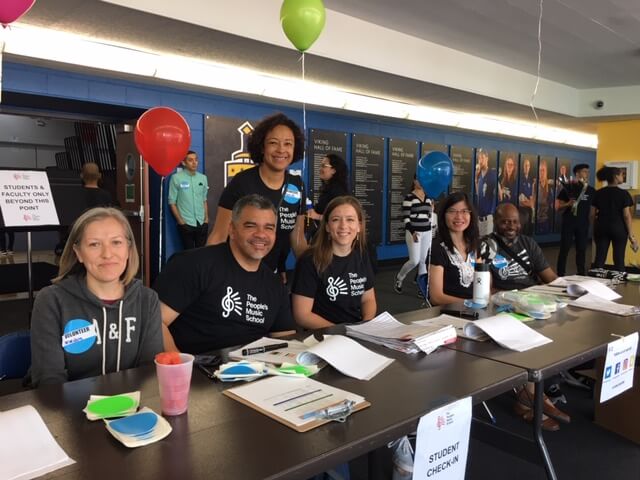
The People's Music School
The People’s Music School is an oasis of musical education and community support. Established in 1976 by Dr. Rita Simó, this institution offers high-quality, tuition-free music education to children in Chicago. Their mission is to provide access to the transformative power of music, nurturing not just musical skills but also fostering social, emotional, and intellectual growth.
The school’s vision is to create a society where all children can benefit from the emotional and social advantages of musical excellence. They believe that music has the power to empower youth, families, and communities. The values of opportunity, excellence, hard work, creativity, and community guide their work.
Their programs focus on intensive music instruction, with professionally trained faculty offering tuition-free education in music theory, group and individual instruction, and performance ensembles. The school serves over 725 students across multiple program sites, aiming to eliminate barriers to access for those who might not otherwise have the opportunity for such education.
Volunteers play a crucial role in the school’s success. They contribute daily by assisting in various capacities, from running daily music programming to helping during community performances. Volunteers are often involved in tasks at musical events like handing out programs, guiding attendees, taking photos, and more. While there’s no mandatory training, volunteers are oriented based on specific roles they take up.
The school welcomes both individuals and groups interested in volunteering. Whether it’s office colleagues, teams, or community groups, anyone passionate about supporting music education can get involved. Those looking to volunteer can connect with the organization by contacting development@peoplesmusicschool.org.
It’s an inspiring initiative where music becomes a vehicle for personal development and community enrichment, relying on the generosity and support of volunteers to achieve its mission of bringing music education to all who seek it.
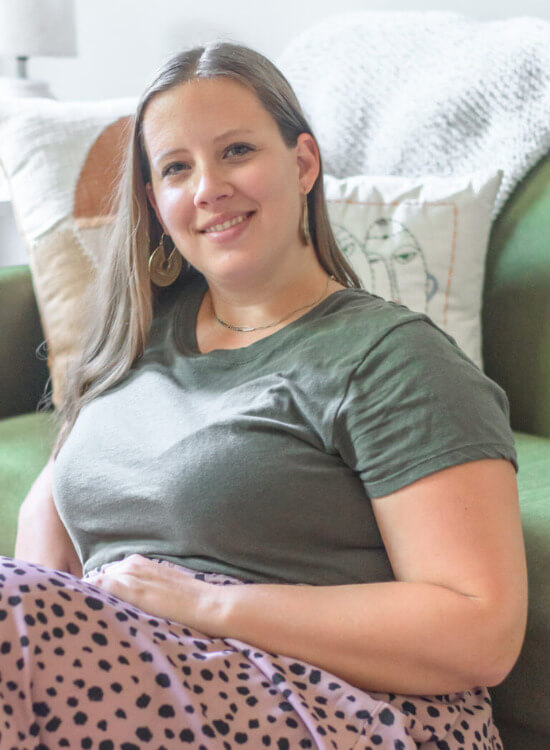
Bellamy & Associates
Bellamy & Associates, led by Katie Bellamy, a Licensed Clinical Professional Counselor (LCPC), opened its doors in 2018 as a holistic therapy and wellness practice. Operating primarily virtually, their services encompass therapy, coaching, and energy healing, focusing on...
Bellamy & Associates, led by Katie Bellamy, a Licensed Clinical Professional Counselor (LCPC), opened its doors in 2018 as a holistic therapy and wellness practice. Operating primarily virtually, their services encompass therapy, coaching, and energy healing, focusing on holistic well-being for the mind, body, and spirit. They assist individuals in healing from trauma, addiction, anxiety, depression, and body image issues, offering corporate wellness workshops and presentations on diverse topics. Katie’s inspiration to start the business stemmed from a long-held intuition of creating personal freedom while empowering others, evolving now to a mission of collective healing and transformation as the practice expanded to include staff and interns.
Although operating virtually, Bellamy & Associates finds roots in Uptown, where Katie provides in-person energy healing sessions. Uptown, where Katie settled in 2021, resonates as a neighborhood she feels genuinely connected to and excited about. What distinguishes their practice is the combination of therapeutic approaches, integrating therapy, coaching, and energy healing, emphasizing self-care within the team to deliver collective care. They challenge barriers, destigmatize mental health care, and venture into accessible well-being.
For Katie, small businesses like hers foster community and reflect the community’s values and personalities, enabling shared conversations and resources. The most significant accolade for Bellamy & Associates is witnessing clients develop self-love and acceptance through their nonjudgmental support, fostering an environment where individuals feel safer, seen, and empowered. Looking ahead, Katie is thrilled by the growth from a solo practitioner to a team and anticipates further positive impact and growth opportunities as they continue to evolve collectively. Website: katie-bellamy.com
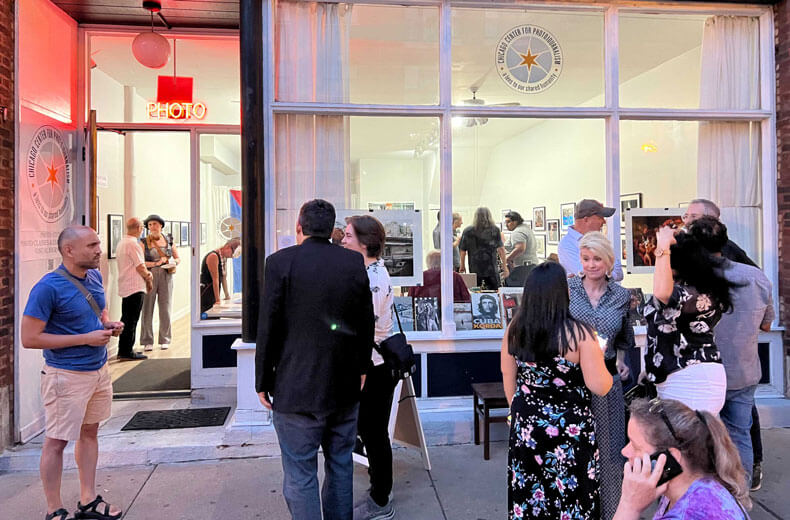
Chicago Center for Photojournalism
The Chicago Center for Photojournalism serves as a hub for celebrating, preserving, and teaching the ethics of photojournalism and the profound impact of photography. Their mission revolves around empowering visual storytellers to illuminate the narratives within their communities and drive action on human rights issues.
Their vision is ambitious: they aim to foster a more just world by leveraging the evocative power of images to celebrate our shared humanity. Curiosity, authentic voice, and ethical practice form the core values driving their initiatives.
The organization offers an array of programs, including community photo classes, photo printing and scanning services, art events featuring photo galleries, and artist lectures. Their contributions extend throughout Chicago, adding cultural perspectives, education, networking opportunities, and free access to the public.
Volunteers are the backbone of their success, embodying qualities of photographers, journalists, artists, and community members. These passionate individuals lend their time and expertise to support the organization’s initiatives. There’s no mandatory training—just a love for art and community.
The Chicago Center for Photojournalism welcomes volunteers of various backgrounds, whether they are part of a group, team, office colleagues, or individuals interested in contributing to the arts and community. Those eager to volunteer can connect with the organization through their website, by visiting their location, or by giving them a call. It’s an invitation for anyone passionate about photography, storytelling, and community engagement to join hands in shaping a more inclusive and vibrant society. Website: www.chicagocenterforphotojournalism.com
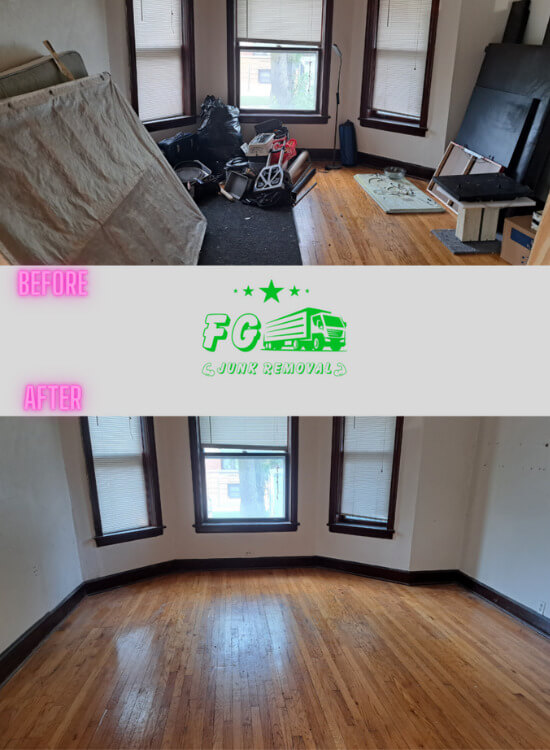
FG Junk Removal
FG Junk Removal, owned by Bel Sam, was established in March of 2023 with a focus on eco-friendly junk removal practices. Specializing in collecting various household items, furniture, and construction debris, their approach extends beyond mere removal, prioritizing sustainability by...
FG Junk Removal, owned by Bel Sam, was established in March of 2023 with a focus on eco-friendly junk removal practices. Specializing in collecting various household items, furniture, and construction debris, their approach extends beyond mere removal, prioritizing sustainability by repurposing and recycling unwanted items. Bel’s drive stemmed from a passion for eco-conscious solutions in the junk removal industry, coupled with a long-standing aspiration to start a business. Uptown was the natural choice for FG Junk Removal, aligning with Bel’s residence and the desire to contribute to the local community.
What sets FG Junk Removal apart is their dedicated professionalism, emphasis on eco-friendly practices, and personalized service. They efficiently clear unwanted items while prioritizing recycling and donations, offering a seamless and environmentally responsible solution. Bel acknowledges the importance of small businesses like theirs in communities like Uptown, recognizing their role in economic growth, job creation, and maintaining local character while fostering community relationships and contributing to neighborhood resilience.
Customers have praised FG Junk Removal for their prompt and efficient service, describing it as stress-free and highlighting their commitment to exceptional service delivery. Looking ahead, Bel is excited about expanding their services, reaching more customers, and continuing to positively impact the community through their eco-conscious approach to junk removal. Website: fgturino.com
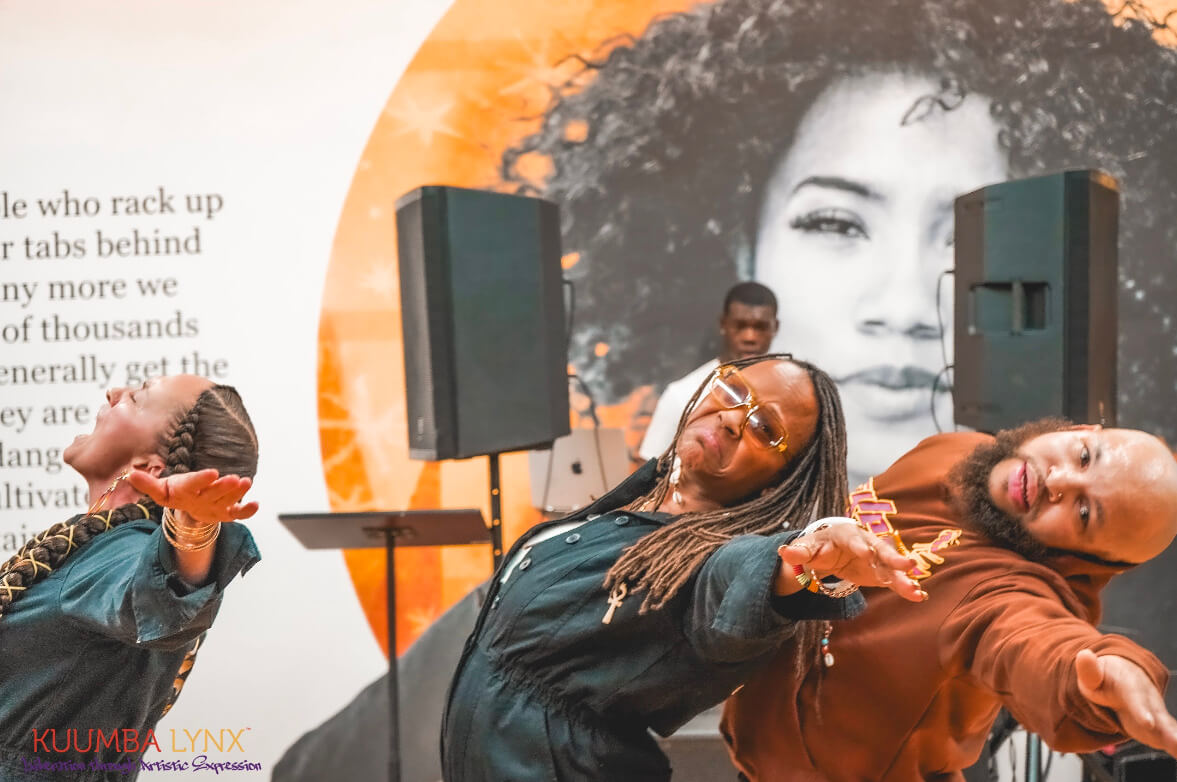
Kuumba Lynx
Kuumba Lynx serves as a catalyst for empowerment and change, utilizing the influence of art and culture to establish a nurturing environment where youth and communities thrive, striving for a world that’s equitable and fair for everyone. Peace, love, and respect are the cornerstones of their values, guiding every initiative they undertake. Their programs range from after-school youth art-making sessions to...
wellness and healing arts, alongside vibrant cultural events like open mic nights and exhibitions.
With a focus on supporting the community in Uptown and across Chicago, Kuumba Lynx invites locals to pitch in and contribute. They’re currently in the process of developing their healing arts space and welcome assistance from individuals willing to contribute their skills—whether it’s carpentry, painting, or building—to help materialize this vision.
Volunteers are crucial to their success, contributing in various capacities such as cleaning, installing art, donating supplies, handling deliveries, and supporting construction projects. While specific training isn’t extensive due to their small staff, volunteers often come together in groups, teams, or as office colleagues to lend a hand.
For those interested in volunteering, connecting with Kuumba Lynx is as simple as sending an email to Jaquanda@kuumbalynx.com. It’s an invitation for anyone passionate about art, community, and fostering equity to join hands and contribute to the creation of a more inclusive and empowered society. Website: www.kuumbalynx.com
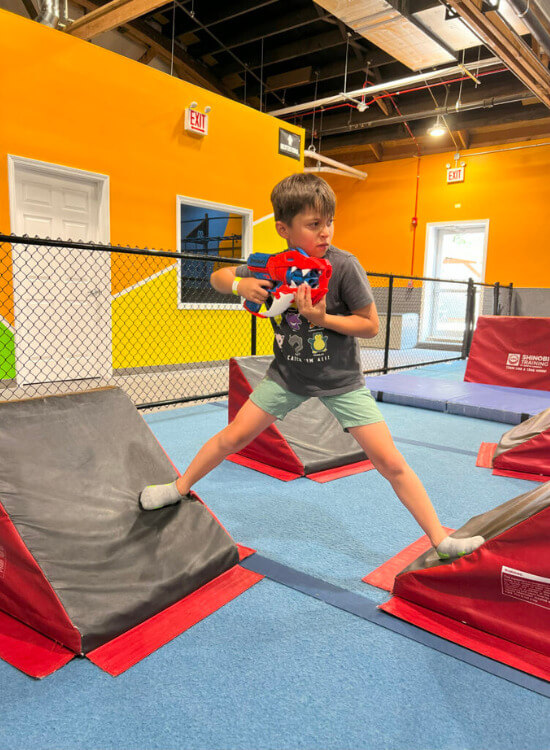
Fit City Kids
Fit City Kids, founded in 2020 by Brad Claggett, stands as Chicago’s hub for family-centric fun and fitness. The business offers an array of distinctive classes, drop-in play sessions, parties, camps, and training sessions tailored for families. Claggett’s inspiration behind ...
Fit City Kids, founded in 2020 by Brad Claggett, stands as Chicago’s hub for family-centric fun and fitness. The business offers an array of distinctive classes, drop-in play sessions, parties, camps, and training sessions tailored for families. Claggett’s inspiration behind launching the venture stemmed from recognizing the necessity for safe and enjoyable spaces where kids could release their energy. Situated in proximity to Uptown, the area’s abundance of young families was an ideal space for business.
What makes Fit City Kids unique is its all-encompassing approach, catering to the entire family unit. Claggett believes small businesses like theirs as integral parts of the community’s essence, striving to align services with local needs and values. Customers keep returning to Fit City Kids for its exceptional cleanliness, highlighting it as the cleanest kids’ venue they have encountered. Claggett is enthusiastic about the business’s future, excited by the prospect of evolving alongside the community and introducing fresh, innovative programs to serve their diverse clientele. Website: fitcitykids.com

Get a Grip Trapeze
Get a Grip Trapeze, founded by Birgit Hampton in August 2023, stands as a unique venture offering flying trapeze, trampoline, and aerial arts classes. As the Owner/Member, Birgit’s inspiration to start this business started from her personal passion for flying trapeze, ignited during her first class back in 2011. The exhilarating experience and the incredible workout it provided...
Get a Grip Trapeze, founded by Birgit Hampton in August 2023, stands as a unique venture offering flying trapeze, trampoline, and aerial arts classes. As the Owner/Member, Birgit’s inspiration to start this business started from her personal passion for flying trapeze, ignited during her first class back in 2011. The exhilarating experience and the incredible workout it provided led her to share this joy with others. Uptown was a natural choice for their location due to the vibrant community and convenient access to public transportation, factors that complemented their vision for a welcoming and accessible space.
The standout feature of Get a Grip Trapeze lies in being the sole flying trapeze school in Chicago, carving out a distinct niche in the market. Birgit strongly believes in the improtance small businesses in communities like Uptown, emphasizing the sense of belonging and home they foster. A testament to the impact of their services was a customer’s touching testimony about how flying trapeze had positively impacted their mental health, boosted confidence, and provided support through their journey.
Birgit’s excitement for her business’s future lies in by her love for trapeze and the community they have built. Her enthusiasm revolves around the desire to share this exhilarating experience, aiming to create a space where others can discover the same passion for flying trapeze and its transformative effects on both physical and mental well-being. Website: getagriptrapeze.com
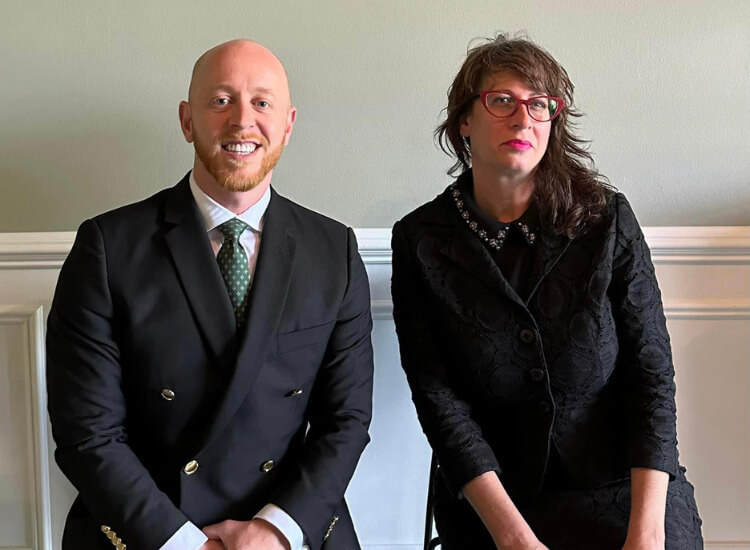
Inclusive Funeral Care
Inclusive Funeral Care, led by Brooke Benjamin and Russ Henrichsen, is an innovative establishment providing cost-effective alternatives to traditional funeral services. Founded in July 2021, their business model mirrors that of funeral homes but at a lower cost, offering a wide range of services from funerals and celebrations to burials, cremations, anatomical...
Inclusive Funeral Care, led by Brooke Benjamin and Russ Henrichsen, is an innovative establishment providing cost-effective alternatives to traditional funeral services. Founded in July 2021, their business model mirrors that of funeral homes but at a lower cost, offering a wide range of services from funerals and celebrations to burials, cremations, anatomical donations, and eco-friendly options. They prioritize efficiency, affordability, beauty, transparency, accuracy, and legality, ensuring no compromise on dignity or respect for their clients.
The inception of their business stemmed from Russ’s desire for autonomy and a shift toward a more transparent approach in the funeral service industry. Brooke, having previously worked for a cremation outfit that prioritized sales over service, shared this vision. A mutual commitment to prioritize service over sales and break away from the corporate norms of the industry motivated the two to collaborate. They chose to open their business in Uptown due to its diverse demographic and rich history, offering a unique mix of people, from Appalachian families to upwardly mobile individuals. They serve the entire city, state, and even offer nationwide plans.
What sets Inclusive Funeral Care apart is not just their cost-efficiency but also their creative thinking, eco-friendly initiatives, and a direct line to the owners rather than an impersonal answering service. They pride themselves on their ability to cater to those who cannot afford standard funeral services, making their business more accessible and inclusive.
Reflecting on the significance of small businesses in a community like Uptown, they emphasize the freedom of choice for consumers, the opportunity for individuals to pursue their dreams, and the diversity of aesthetic choices available. The most validating feedback for them is the return of clients, acknowledging that amidst challenging times, a satisfactory experience that brings people back speaks volumes about their service.
Looking ahead, what excites them most is the prospect of learning more about human nature and hearing the unique stories of each family they serve. They find fulfillment in the diverse narratives of the people they encounter, constantly shaping their business to meet the varied needs of their clientele. Website: inclusivefuneralcare.com
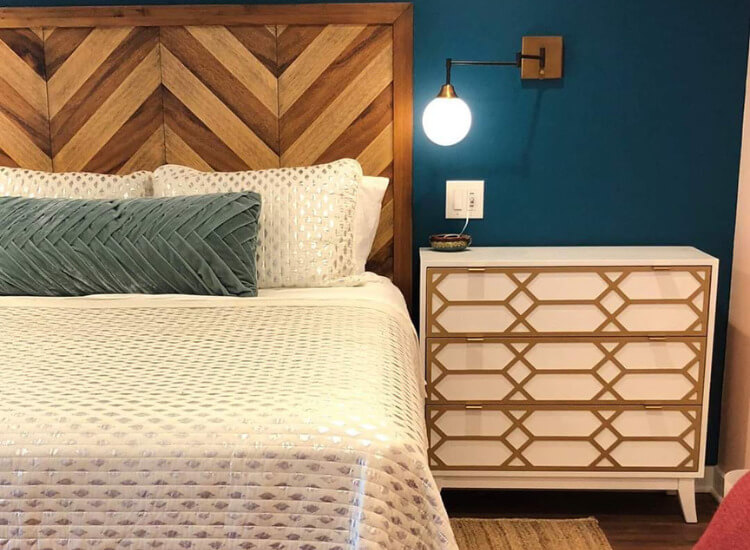
Noble Pro Painting
Noble Pro Painting, spearheaded by Christopher Comer, has thrived in the home improvement realm since its inception in October 2003. The company offers expansive services, specializing in painting, wallcovering, tile, plaster/drywall repair, general construction, and interior design collaboration. The beginning of Christopher’s business arose from...
Noble Pro Painting, spearheaded by Christopher Comer, has thrived in the home improvement realm since its inception in October 2003. The company offers expansive services, specializing in painting, wallcovering, tile, plaster/drywall repair, general construction, and interior design collaboration. The beginning of Christopher’s business arose from his background as an Event Production Specialists, seeking an avenue to channel their creative energies and design skills. Uptown became the home for Noble Pro due to their deep connection to the local community, having been a part of it for over two decades and relishing in its growth and inclusivity.
What sets Noble Pro Painting apart is their approach—a commitment not just to offer a service but to curate a personalized experience that mirrors the client’s individuality and style. They view their projects as partnerships, working closely with clients to bring their visions to life. Christopher’s passion lies in the direct involvement in every project, creating beautiful spaces that resonate with their clients’ identities.
For Noble Pro, the significance of small businesses in Uptown and communities at large lies in fostering connections and a sense of personal investment. They believe it is about supporting neighbors and friends, creating a tight-knit, supportive environment. Clients have lauded their exceptional service and communication, praising their transparency and fair pricing, as exemplified by one glowing review.
Christopher is enthusiastic by the increasing local demand for their services. They anticipate further opportunities to support and serve their community, buoyed by the influx of requests from nearby residents and small businesses. This surge in local support propels Noble Pro Painting’s excitement for the future, eager to continue contributing to the flourishing fabric of their beloved community. Website: noblepropainting.com
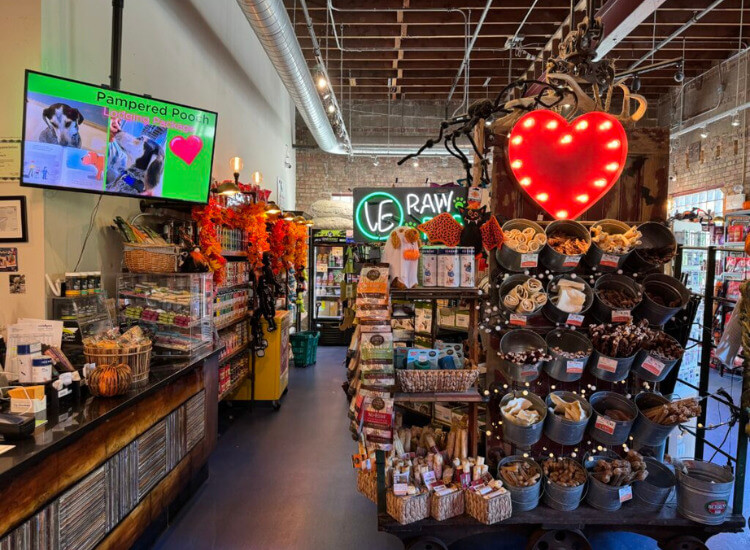
Urban Pooch Canine Life Center
Ed Kaczmarek, the Co-Founder of Urban Pooch Canine Life Center since its establishment in December 2010, has cultivated a space where pets are like family. Urban Pooch stands out as a comprehensive hub for pet care needs, providing nutritious food, treats, toys, accessories, and comfortable beds, all delivered with love. The facility offers top-notch services including...
Ed Kaczmarek, the Co-Founder of Urban Pooch Canine Life Center since its establishment in December 2010, has cultivated a space where pets are like family. Urban Pooch stands out as a comprehensive hub for pet care needs, providing nutritious food, treats, toys, accessories, and comfortable beds, all delivered with love. The facility offers top-notch services including grooming spa, daycare, cageless boarding, and training, striving to be the happiest and cleanest spot in Chicago for pooches, proudly expressing their LGBTQ+ ownership. Inspired by their Welsh Terrier, Berwyn, Ed, and the team aimed to create a professional pet care business that meets various needs of pet parents under one roof, driven by their commitment to be the cleanest and most loving space for pets, a goal they have achieved.
Situated in Ravenswood & Bowmanville, next door to the Uptown Community, Urban Pooch believes in serving long-time residents and enthusiastic pet parents in the area. Their uniqueness stems from extensive training for their pet care professionals, who prioritize the wellbeing of both pets and their owners. Urban Pooch received recognition as Best Doggie Daycare, Best Groomer, and Best Pet Store in Chicago, earning a spot among America’s Coolest Pet Stores. Reflecting on the importance of small businesses, Ed emphasizes their role as the backbone and economic engine of Chicago, particularly highlighting their significance in fostering vibrant communities.
Customers’ heartfelt comments, like their dogs getting excited when heading to Urban Pooch, demonstrate the warmth and joy the center brings to both pets and their owners, making it a favorite destination for furry family members. Ed hopes the evolution of their services and products, aiming for excellence while dazzling their pooch clients and their parents continue well into the future. Website: urbanopooch.com
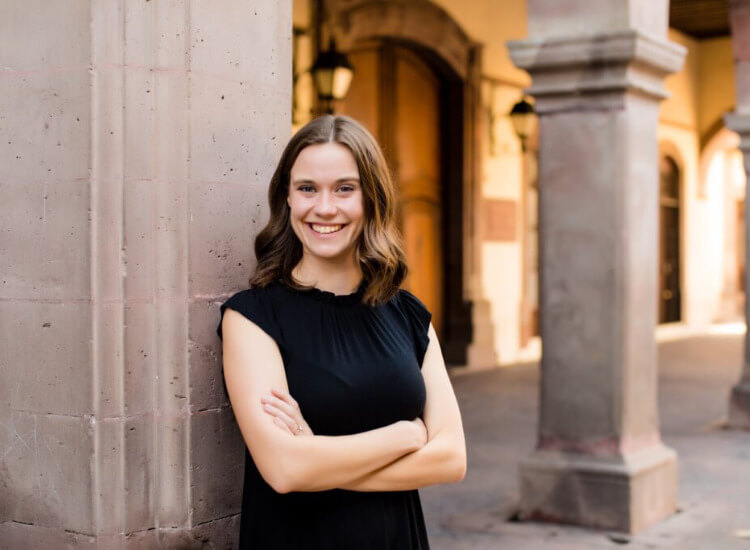
Vacay by MJ
Melanie Julison, the Founder and Travel Advisor of Vacay by MJ, established the boutique travel agency in 2022. Specializing in leisure travel across Europe and the Americas through vacaybymj.com, Melanie ensures a seamless and fulfilling vacation experience, tailoring itineraries to her clients’ preferences and managing every aspect of the trip, acting as an advocate...
Melanie Julison, the Founder and Travel Advisor of Vacay by MJ, established the boutique travel agency in 2022. Specializing in leisure travel across Europe and the Americas through vacaybymj.com, Melanie ensures a seamless and fulfilling vacation experience, tailoring itineraries to her clients’ preferences and managing every aspect of the trip, acting as an advocate alongside trusted travel partners abroad. Motivated by her passion for inspiring cultural exploration from her background in international higher education, Melanie recognized the need for a dedicated focus on encouraging travel abroad, leading her to venture into entrepreneurship with Vacay by MJ.
Relocating her home-based agency to Uptown in May 2023, she appreciates the neighborhood’s proximity to the lake and its cozy, small-town atmosphere. What distinguishes her business is the deeply personalized approach to travel planning, collaborating with smaller luxury accommodations and private guides to craft unique itineraries for clients. Melanie underscores the significance of small businesses in communities like Uptown, emphasizing their personal investment in community health and their role in nurturing vibrant local cultures when residents and businesses support each other. Customer feedback praising her attentive planning amidst a noisy world resonates deeply with her. Moving forward, Melanie’s excitement lies in cultivating long-term relationships with repeat clients, planning multi-generational family trips, and celebrating various milestones in their lives through personalized travel experiences. Website: vacaybymj.com
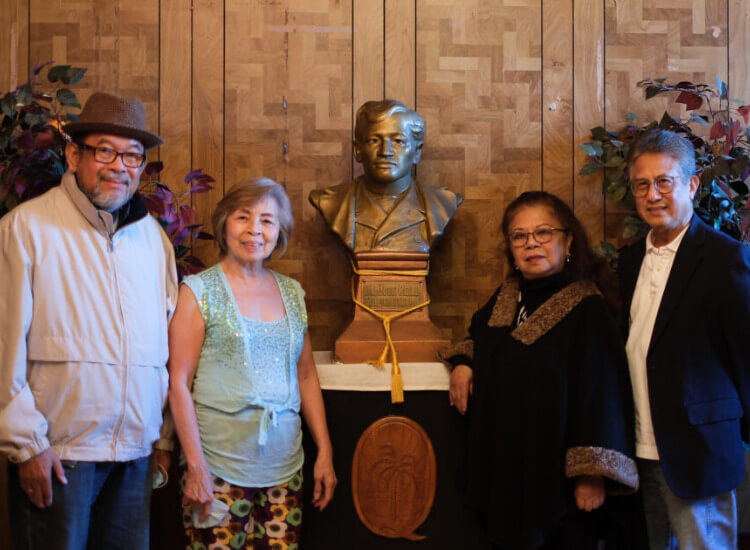
Rizal Center
Chicago’s Filipino American community has experienced a profound evolution over recent decades, with the Rizal Center at its core. Starting as a modest “clubhouse,” developing into a thriving community center, facing a 5-year hiatus, and eventually reopening in 2022, it stands as a testament to the resilience and cultural pride of the Filipino American Council of...
Chicago’s Filipino American community has experienced a profound evolution over recent decades, with the Rizal Center at its core. Starting as a modest “clubhouse,” developing into a thriving community center, facing a 5-year hiatus, and eventually reopening in 2022, it stands as a testament to the resilience and cultural pride of the Filipino American Council of Greater Chicago (FACGC). Esteemed board members Mae Dawn Gaoat-Lant, Willi R. Buhay, Jerry Clarito, and Corazon Sopena, offer their insights and perspectives on the inception of the FACGC and the Rizal Center, illuminating the progress made and their aspirations for the future.
Initially established as the Filipino National Council of Chicago (FNCC) in 1953, the original founders aimed to forge a sense of community and belonging for Chicago’s Filipino American population through the creation of a “Filipino Clubhouse” — a sanctuary of support for the diaspora. While the organization evolved and changed its name to FACGC in 1997, the fundamental struggle for belonging and the necessity of a safe space to nurture their cultural heritage persisted. In 1974, the FNCC’s vision of a physical home became a reality when they acquired a facility from the Swedish-American Orphei Singing group. The FNCC’s “clubhouse” transformed into the Rizal Center.
The center transcends being merely a physical structure. It embodies a revitalized perspective on Filipino American identity and approaches to engaging with the community, neighborhood, and the larger city. Jerry Clarito, the current Board Chair of FACGC, underscores this evolving purpose and its realization through the Rizal Center. Clarito expounds, “The mission of FACGC in its new iteration is to enhance the well-being of Filipinos and the community through transformative programs rooted in cultural, economic, and social initiatives, encapsulated by the first four letters of our alphabet, ABKD…A for action, B for bayanihan (people working together), K for kapitbahayan (neighborly concern), and D for damayan (compassionate mutual aid).”
The Rizal Center serves as the space where the organization’s mission springs to life. It stands as a welcoming, dynamic haven for individuals of diverse backgrounds to come together, fostering connections, appreciation, and understanding of Filipino and Filipino American experiences in Chicago, as well as their place in American society and intersections with diverse cultures.
However, in January 2017, a five-year legal dispute unfolded, centering on a hostile takeover within a 21-member board. Four board members, including the president and an unauthorized executive director, displaced some members, citing extended service. Invoking the Illinois Good Samaritan law, which safeguards volunteers, was instrumental in supporting the return of the Rizal Center to the ousted board members. This struggle exceeded organizational boundaries, becoming a community-wide concern, spotlighting the concept of ‘people power.’ The goal was not power, but to reinstate the ability to serve the community, emphasizing that the community, not solely the organization, was affected by the takeover.
Willi R. Buhay reflects on the significance of this challenge through his longstanding commitment to the Rizal Center. Having served as a FACGC Board Member and Artist in Residence for 29 years, he has observed the evolution of leadership and community dynamics. Though he acknowledges the ebb and flow of generational organizational challenges, Buhay emphasizes the importance of progressive and inclusive leadership and advocates for sharing aspirations and leaving a legacy that continues to thrive and inspire. For Buhay, life’s essence lies not in material gains, but in the enduring impact one imparts.
Mae Dawn Gaoat-Lant, a nurse with 48 years of experience, has been engaged with the Rizal Center for 33 years. She notes the center’s evolution from modest gatherings to a more meaningful community-oriented organization, but there was a time where there was a shift in values, with an emphasis on power and money, leading to a decline in community spirit. The current mission, Mae shares, emphasizes holistic community development and bridging generational divides. Gaoat-Lant advocates for integrating and enriching Filipino culture and recognizes the need for collaboration with other organizations for community progress. This signifies a notable shift from the past, aiming to aid and address various issues faced by the Filipino American community.
In recent times, FACGC has made substantial strides in opening its doors to various communities and organizations, as evidenced by hosting the Vietnamese Association of Illinois retreat. They have organized events commemorating Asian American Pacific Heritage Month, receiving positive feedback from attendees. Additionally, they orchestrated the inaugural drag celebration and provided a platform for human rights advocacy, spotlighting their connection to issues in the Philippines. Jerry Clarito asserts that collaborative events are more than just that; they serve as intimate spaces for storytelling and forging meaningful social connections. Through these collaborations, the FACGC addresses the profound need for social connection, recognizing the psychological and emotional impacts of disconnection.
FACGC also employs the arts as a powerful tool for transformation. Clarito and Buhay emphasize that art has the unique ability to transcend language, uniting people through shared experiences. FACGC’s engagement strategies, including the utilization of online platforms for fundraising and a dynamic website that empowers individuals to contribute, further strive for collaboration and connection. They acknowledge that engagement is vital for constructing a stronger community, one individual at a time. By valuing individual contributions, they work toward their mission of uplifting the community’s well-being.
The significance of preserving spaces like the Rizal Center for the community’s cultural heritage holds immense weight for those involved. Corazon Sopena, a dedicated member since 1996, underscores its vital role for seniors, providing a sense of belonging and purpose. She fondly recalls her time serving meals to seniors, a cherished activity she holds close to her heart. Willi R. Buhay, who regards the center as an extension of his own home, emphasizes its role in fulfilling his yearning for a sense of belonging, especially in his senior years. He speaks of the importance of preserving the vision of the pioneers who sought it as more than just a clubhouse, but a hub for an entire community. Mae Dawn Gaoat-Lant, for whom the center symbolizes Filipino identity, highlights its resilience and the strength it represents. She sees it as a testament to the Filipino community’s ability to overcome challenges and a source of pride. Jerry Clarito underscores the center’s importance as a safe space, a “home away from home,” where individuals can be their authentic selves. Jerry stresses the need to preserve history, even if the physical building undergoes changes, so that the legacy endures.
The FACGC’s journey, spanning seven decades, is marked by both triumphs and tribulations. With the re-opening of the doors of the Rizal Center, FACGC is pioneering a new era of inclusivity, where diverse voices and stories come together to shape a stronger, more connected community. Their legacy is one of resilience, unity in diversity, and a profound commitment to preserving the Filipino heritage while forging a shared sense of home and belonging for all members of the community.
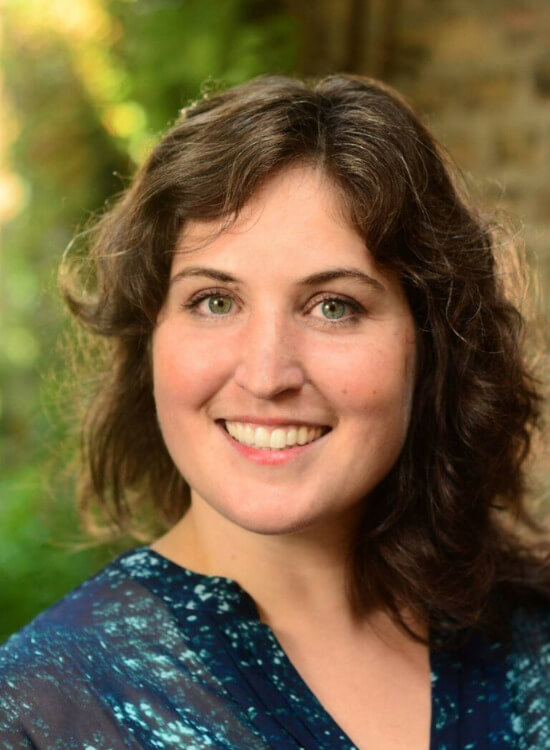
Yoga Body Elements
Cindy Huston, the Owner of Yoga Body Elements since its establishment in 2015, fosters whole-body wellness through her business, displayed through their diversity of programming, events, and classes. What sets Yoga Body Elements apart is its focus on holistic wellness...
Cindy Huston, the Owner of Yoga Body Elements since its establishment in 2015, fosters whole-body wellness through her business, displayed through their diversity of programming, events, and classes. What sets Yoga Body Elements apart is its focus on holistic wellness technologies such as Bicharger NG, infrared Biomat, and Ipyramid ITorus.
Cindy’s inspiration to consolidate her expertise into one space stemmed from the overwhelming capacity of aiding seven other spa and wellness businesses in Chicago, leading her to bring all services under a unified roof. Uptown’s location and diverse community drew her to establish her business there. Reflecting on the significance of small businesses in a community like Uptown, Cindy highlights their role in keeping creativity and purpose thriving.
One of the most touching customer testimonials she received was, “Your services saved my life,” underscores the impact of her offerings. Cindy’s excitement lies in the future, with new collaborations and the creation of innovative wellness solutions, propelling Yoga Body Elements toward further growth and impact. Website: yogabodyelements.com
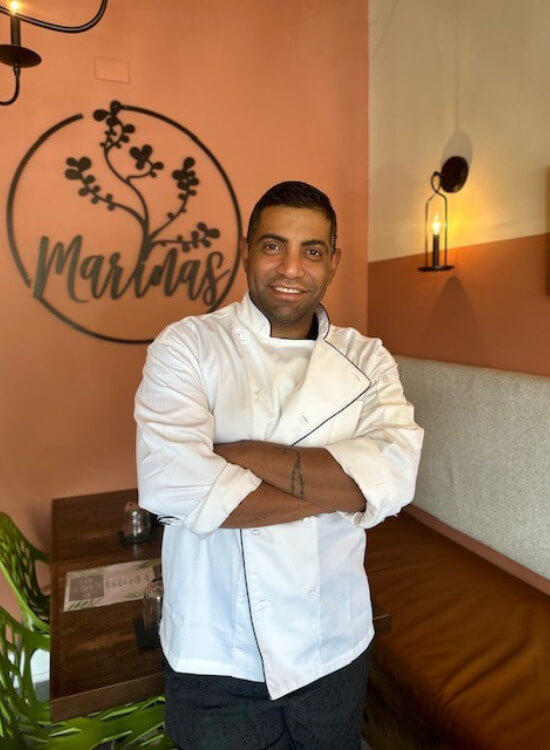
Marina’s Bistro and Rum Bar
In a nondescript strip mall along Wilson Avenue here in Uptown, a culinary gem has emerged, bringing with it the vibrant flavors of Puerto Rican cuisine. Marina’s Bistro and Rum Bar, owned and led by Chef Eric Roldan, is not just a restaurant; it is a testament to perseverance, authenticity, and a...
In a nondescript strip mall along Wilson Avenue here in Uptown, a culinary gem has emerged, bringing with it the vibrant flavors of Puerto Rican cuisine. Marina’s Bistro and Rum Bar, owned and led by Chef Eric Roldan, is not just a restaurant; it is a testament to perseverance, authenticity, and a tribute to Eric’s late mother.
Marina’s Bistro began as a humble ghost kitchen in Avondale, specializing in pick-up and delivery. Recognizing the potential for growth, Chef Eric decided to take a bold step forward. In 2022, he made the pivotal decision to close the pick-up and delivery service and open Marina’s Bistro as a brick-and-mortar establishment in Uptown. “My whole concept that I wanted to do here is have an authentic Puerto Rican cuisine with a rum bar specializing in craft cocktails and I chose Uptown because Uptown is a diverse community. I used to grow up here when I was little before I moved back to Puerto Rico. I thought that was a great location to give people a different taste of our cuisine, because there is no Puerto Rican cuisine over here up north”, shares Chef Eric.
Chef Eric’s commitment to authenticity is evident in every dish. Understanding the diversity of dietary preferences, he ingeniously incorporates vegan and vegetarian options without compromising on the rich flavors of Puerto Rican cuisine. Signature dishes like the Mofongo, a classic made with a unique twist, and the Puerto Rican rice, artfully crafted without meat, are testaments to Chef Eric’s dedication to preserving tradition while accommodating diverse palates.
Marina’s Bistro is more than just a business for Chef Eric. It is a tribute to his late mother who instilled in him a love for cooking from an early age. Chef Eric shares, “When I was little, my mom, she taught me how to cook…and you know, before she passed, the words that I remember that she told me were ‘make me proud.’ Chef Eric kept these words with him always, and when he moved back to Puerto Rico, he pursued culinary school, merging his passion for cooking with the promise to make his mother proud. The opportunity arose when Eric moved back to the U.S. and started the ghost kitchen. When thinking of names, he knew it had to be Marina’s, his mother’s name. Naming the restaurant after her, he not only honors her memory but also shares her legacy through the flavors of Puerto Rican cuisine.
As a Latino-owned business, Chef Eric recognizes the significance of representation in the culinary world. He saw a void in the market for authentic Puerto Rican cuisine in Chicago, particularly on the Northside. Through Marina’s Bistro, Chef Eric breaks barriers, paving the way for more diverse culinary experiences and encouraging aspiring entrepreneurs to pursue their dreams. Chef Eric’s journey to opening Marina’s Bistro was not without its challenges. Facing multiple loan rejections, he persisted in finding someone who believed in his vision. Through determination and a stroke of luck, he secured an SBA loan and a recovery grant. Chef Eric’s story serves as an inspiration to aspiring entrepreneurs, reminding them to persevere in the face of adversity.
Marina’s Bistro prides itself on using fresh, farm-sourced ingredients, ensuring that each dish is a true representation of Puerto Rican flavors. The Jibaritos, a Chicago original, the garlic-infused Mofongo, and the triple-meat delight, the Tripleta, are just a few of the must-try dishes that highlight the depth and variety of Puerto Rican cuisine. With Marina’s Bistro’s rapid success, Chef Eric envisions expanding his culinary dream. He hopes of opening another location or expanding the current one to share the love for authentic Puerto Rican cuisine with an even broader audience.
Marina’s Bistro and Rum Bar is not just a restaurant; it is a labor of love, a testament to the power of perseverance, and a celebration of family and Puerto Rican culture. Chef Eric Roldan’s culinary creations are an invitation to experience the warmth and vibrancy of Puerto Rico right here in Uptown Chicago. Come, taste the legacy, and be transported to the colorful streets of San Juan with every bite.
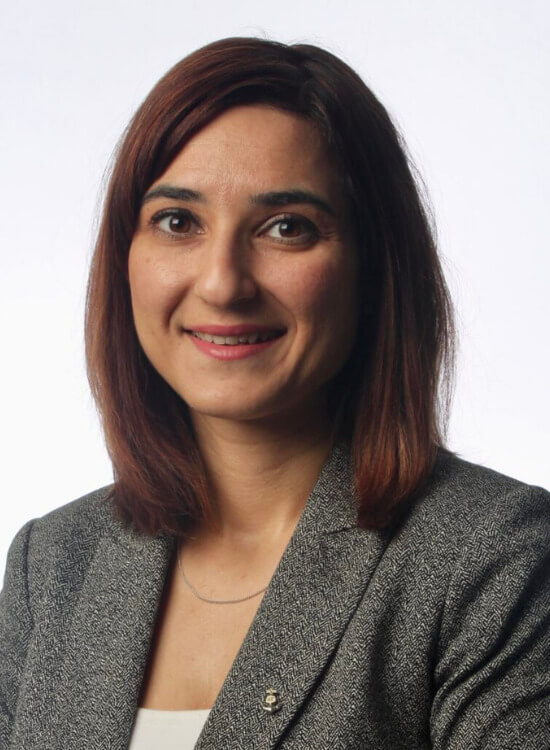
Willow Vision Health
Willow Vision Health, led by Doctor of Optometry Karina Fulton, commenced its journey in September 2022, focusing on comprehensive eye care for diverse age groups. They highlight a range of services, from prescribing glasses and contact lenses to overseeing emergency...
Willow Vision Health, led by Doctor of Optometry Karina Fulton, commenced its journey in September 2022, focusing on comprehensive eye care for diverse age groups. They highlight a range of services, from prescribing glasses and contact lenses to overseeing emergency eye conditions and conducting pediatric vision function exams relating to reading abilities. Dr. Karina’s inspiration stemmed from the struggle to find an environment allowing ample time for thorough primary eye care, fostering her drive to establish a practice prioritizing integrative eye health.
Uptown was a natural choice due to its proximity to Karina’s office and home, but more profoundly, it resonated with her personal journey as an immigrant navigating assimilation and language learning. Embracing Uptown’s cultural diversity and inclusivity, Willow Vision Health embodies uniqueness through Dr. Karina’s solo ownership, providing individualized care with flexible appointment scheduling, accommodating patients’ work and school commitments. With portable equipment, she extends comprehensive eye care beyond her office, emphasizing collaboration and patient empowerment in every interaction.
For Dr. Karina Fulton, small businesses in communities are vital for fostering a network of trust and collaboration among owners. The highest compliment for her business is the consistent referral of family members working in healthcare. Looking ahead, what excites her most is the opportunity to impact children’s lives positively by improving their vision. Early diagnosis of eye conditions can significantly enhance learning abilities, and Dr. Karina finds immense fulfillment in helping children overcome visual challenges, fostering their confidence and academic success. Website: willowvisionhealth.com
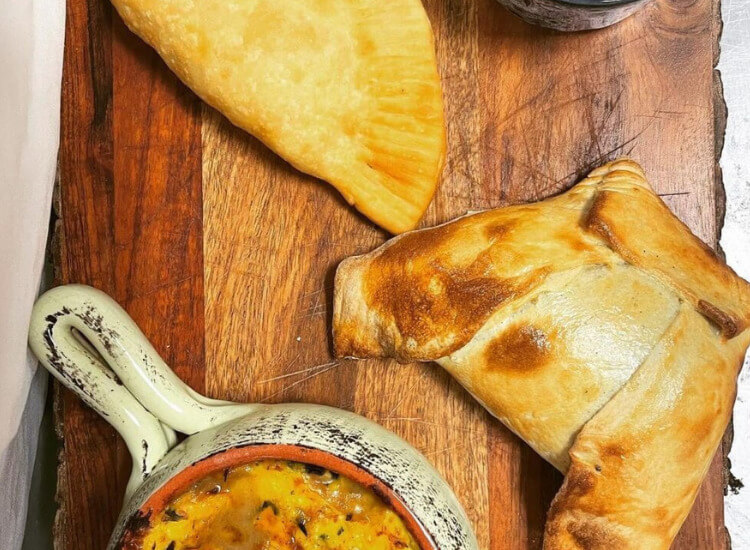
Don Pablo’s Kitchen & Bakeshop
Pablo Cesar Soto, a proud Chilean native, embarked on a journey to the United States in 1996 with a singular purpose – to master the English language. Little did he know that this decision would lead to a serendipitous meeting with his future wife, Julie Morrow-Soto. Fast forward to the year 2000, they tied the knot, united by a shared dream of venturing...
Pablo Cesar Soto, a proud Chilean native, embarked on a journey to the United States in 1996 with a singular purpose – to master the English language. Little did he know that this decision would lead to a serendipitous meeting with his future wife, Julie Morrow-Soto. Fast forward to the year 2000, they tied the knot, united by a shared dream of venturing into the world of restaurant entrepreneurship. This dream materialized in the form of Don Pablo’s Kitchen & Bakeshop located at 1007 W Argyle Street.
The decision to open Don Pablo’s was one born out of necessity and opportunity amidst the pandemic. The shift to remote work provided Pablo and Julie the time for introspection about their future. On October 1st, 2020, Don Pablo’s was officially born.
Uptown was the chosen location, a diverse neighborhood with the picturesque Argyle Street. The decision to bring a unique menu to this community was an easy one, driven by the desire to offer something different and exciting.
What sets Don Pablo’s apart is its distinctiveness. It stands as the sole Chilean restaurant not only in Chicago but across the entire Midwest. While every Latin American country boasts its own version of empanadas, Don Pablo’s Chilean style stands out with its larger size and exceptional dough, setting a new standard for this beloved dish.
Food holds a special place in Pablo’s heart. The empanada Clásica, a quintessential Chilean dish, resonates deeply with him. The amalgamation of succulent meat, aromatic onions, and a blend of spices encapsulates the essence of Chilean cuisine. For Pablo, it represents a taste of home, a sentiment he is eager to share with the community. He firmly believes that everyone deserves to experience the exquisite flavors of Chilean empanadas.
Opening Don Pablo’s came with its challenges. Securing the funds and introducing a new empanada concept to the market were initial hurdles. Overcoming these obstacles was integral to providing a product of excellence to their cherished guests and instilling confidence in their project.
As a Hispanic-owned business, Pablo recognizes the importance of leadership within the community. Being a success story is a powerful message, one that speaks to the potential within everyone. His advice to aspiring entrepreneurs within the diaspora is to dream big, be creative, and build their own legacy.
Membership in the Uptown Chamber of Commerce has been instrumental in Don Pablo’s journey. The Chamber’s support has been a guiding light over the past two years. The reciprocal support for the community and the active participation in events have strengthened the bond between Don Pablo’s and the vibrant Uptown neighborhood.
Pablo’s greatest accomplishment has been bringing the taste of Chilean cuisine back to Chicago and witnessing the overwhelming love and appreciation it has received. Don Pablo’s stands proudly as a representative of an entire country’s culinary heritage in a city known for its discerning palate. Looking ahead, Pablo envisions more businesses, more growth, and increased safety on the streets. The transformation of Argyle Street and the Uptown community has been a joy to witness, and Don Pablo’s is eager to be an integral part of its ongoing
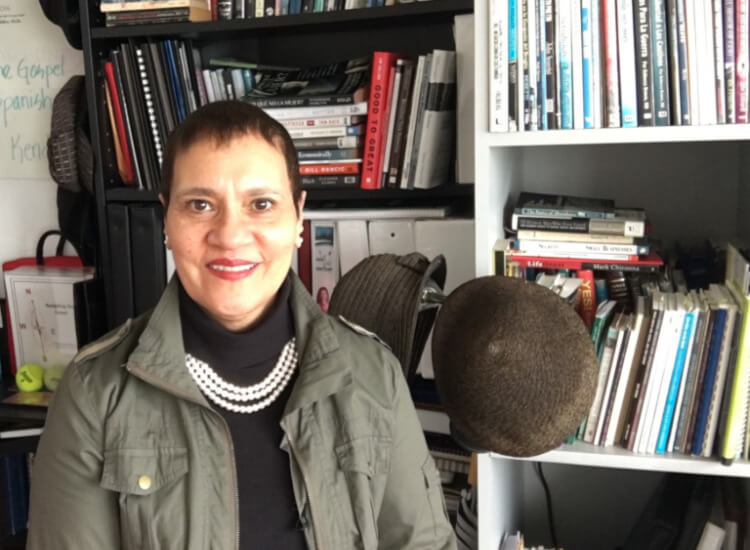
Plus Bookkeeping Services, Inc.
A unique business stands as a beacon of financial empowerment for small enterprises here in our Uptown neighborhood. Plus Bookkeeping Services, Inc. (PBSI) is more than just a bookkeeping agency; it’s a hub of financial expertise, combining accounting, financial literacy, marketing, and business growth tools under one roof. Founded by the accomplished Nancye, PBSI has...
A unique business stands as a beacon of financial empowerment for small enterprises here in our Uptown neighborhood. Plus Bookkeeping Services, Inc. (PBSI) is more than just a bookkeeping agency; it’s a hub of financial expertise, combining accounting, financial literacy, marketing, and business growth tools under one roof. Founded by the accomplished Nancye, PBSI has flourished from its modest beginnings to become a thriving team of dedicated professionals.
Nancye’s journey began with a passion for numbers and a determination to make a difference. Armed with a Bachelor’s degree in Spanish and Sociology from DePaul University, she was accepted at the remarkable age of 16. Her thirst for knowledge didn’t stop there; she pursued a Masters of Arts from Columbia College Chicago in Arts, Entertainment, and Media Management, becoming a Weisman Scholar. Later, she even taught Accounting 101 at the undergraduate level. However, her path took an unexpected turn when she received a Certificate in Foundations of Faith from North Park Theological Seminary. This fusion of skills and spiritual grounding laid the foundation for PBSI’s unique approach to financial consultancy.
With over two decades of experience, Nancye took the leap to establish PBSI in 2016. Armed with little more than her computer and Excel, she began her journey towards helping small businesses understand their financials. Today, PBSI boasts a team of five bookkeepers, three accountants, and two CPAs. Their mission is clear: to empower small businesses, turning them into visionaries by utilizing their financials as a roadmap for growth. PBSI doesn’t stop at bookkeeping. Nancye’s commitment to financial literacy and entrepreneurship is evident through her workshops. As an adjunct professor at the Hispanic Bible School, she imparts her wisdom in Administration and Finance, Media Ministry, and Homiletics. This dedication to education is a testament to her vision of uplifting the community through knowledge.
Nancye’s commitment to staying current with accounting principles, technology, and tax laws is evident in her certifications as a QuickBooks Online ProAdvisor and a Certified Tax Preparer. Her participation in various entrepreneurial programs, including the Women’s Business Development Center and the Rogers Park Business Alliance, showcases her dedication to continuous improvement. As a Hispanic-owned business, Nancye recognizes the importance of leadership within the community. Her belief in providing direction, motivation, and guidance serves as an inspiration for fellow Hispanic business owners. She fosters a culture of excellence, accountability, and innovation, which are pivotal for the growth of any business community.
Choosing Uptown as the base for PBSI was a deliberate decision. Nancye saw the potential in the diverse community, recognizing its richness in small businesses. Her involvement as a member of the Uptown Chamber has allowed her to advertise her services effectively, further contributing to the community’s economic vibrancy. The impact of PBSI on its clients is palpable. By ensuring small businesses understand their financial statements, they are empowered to plan effectively. Nancye and her team treat their clients with respect and honor, fostering an environment of trust and collaboration.
As Nancye reflects on her journey, she sees both accomplishments and challenges. The consistent growth of her business is a testament to her dedication. However, marketing remains a persistent challenge. Nevertheless, she remains resolute in her vision of expansion, especially within the Latino market, and assisting businesses in tax compliance. Plus Bookkeeping Services, Inc. is more than a business; it’s a testament to the power of knowledge, leadership, and community. Nancye’s journey from scholar to visionary showcases the potential that lies within individuals driven by purpose. As PBSI continues to grow, it stands as a beacon of hope for small businesses, urging them to excel for greatness.

Fat Miilk
In a world where dreams often take a backseat to practicality, Lan Ho’s journey to founding Fat Miilk stands as a testament to the power of pursuing one’s passion. What began as a simple coffee concept grew into a symbol of Vietnamese culture, innovation, and community soon to be in the heart of Asia on Argyle’s Uptown, Chicago. Lan’s story takes us through the pivotal moments that brought Fat Miilk to life, from the initial seed of an idea to...
In a world where dreams often take a backseat to practicality, Lan Ho’s journey to founding Fat Miilk stands as a testament to the power of pursuing one’s passion. What began as a simple coffee concept grew into a symbol of Vietnamese culture, innovation, and community soon to be in the heart of Asia on Argyle’s Uptown, Chicago. Lan’s story takes us through the pivotal moments that brought Fat Miilk to life, from the initial seed of an idea to the upcoming vibrant flagship store to soon sit at the entrance of Uptown’s Asia on Argyle.
Before embarking on her entrepreneurial journey, Lan Ho was a board-certified pharmacist, caught in the crossroads between her parents’ expectations and her true calling. The seed of Fat Miilk had been planted in her mind for years, but it wasn’t until she experienced the dissatisfaction of her pharmacy career that she decided to embrace her creativity and build the coffee concept she had always envisioned. “You know your parents are scared and saying, ‘oh, no, just play it safe’, and our parents are losing everything coming here, you know. And I feel like that’s the reason why I feel so confident in my decision, because I did that, I literally did exactly what my parents wanted and I was miserable the entire time, but I would convince myself this is good,” says Lan. Lan’s strength, determination, and ability to teach herself anything became her guiding lights as she ventured into uncharted territory.
Incorporating Fat Miilk in 2019, Lan’s passion for Vietnamese culture and her family’s history provided the foundation for her brand. Lan shares “Not only do I have such a passion for representing Vietnamese culture, but I also feel like my family made such an impression on me; I think the courage that I see in my parents moved me and so I always had this strong impression when it came to Vietnamese culture and the stories that came with refugees.” She also saw an opportunity to bring Vietnamese coffee into the mainstream, making it accessible beyond traditional venues like banh mi restaurants. Lan always thought, “why can’t I just go down the street to my community neighborhood coffee shop and enjoy Vietnamese coffee…like it just did not exist in my world…it was a light bulb moment for me.” Lan’s deep connection to her roots and her creativity led her to craft a unique vision for Fat Miilk, one that celebrates Vietnamese culture and coffee while embracing innovation.
Lan’s journey took an unexpected turn when she was invited to compete on Gordon Ramsay’s Food Stars, a show dedicated to discovering and investing in food and beverage entrepreneurs. While Lan’s parents remained unaware of her venture, she seized the opportunity to showcase her brand on a national platform. “I was actually the last contestant to be recruited and, in my head, I was thinking, like, ‘Man, if I am really going to do Fat Miilk, I really have to take a risk’. Even though everyone’s like, ‘Oh my gosh, look at you, you’re made for TV, you’re this and that’…No, I went on the show to blow up my business. That was my intention 100%,” shares Lan. Competing for Gordon Ramsay’s investment, Lan navigated the challenges of the show, leveraging her Vietnamese heritage and innovative spirit to stand out. The show marked a turning point, with Lan keeping her business endeavors hidden from her parents until her appearance aired on television. Gordan Ramsay’s Food Stars aired their finale last week with Lan being one of three final contestants. Although she did not leave the show as the final winner, this pivotal moment of being on the show and making it to the final 3 was a culmination of her determination to prove herself through actions rather than words. The experience solidified her commitment to Fat Miilk and reinforced her resolve to succeed on her terms.
Lan’s passion for Vietnamese culture and her desire to contribute to her community led her to the vibrant neighborhood of Uptown, Chicago. Recognizing the importance of embracing her heritage, she set her sights on a corner spot on Broadway and Argyle, a location that symbolized the intersection of her Vietnamese identity and her entrepreneurial vision. This area became a canvas where she could celebrate her culture and introduce her brand to the world. “I knew it had to be Uptown…like it really exemplifies what Fat Milk is all about and it’s like treasuring your past and investing in your future, you know? I think me being Vietnamese, it’s like it’s a no brainer…it’s a perfect fit. I just knew that I needed to pay homage to my peoples and the community here that made me who I am, and I hope that my presence being here bringing this brand here encourages other Vietnamese people to not shy away from pouring back into their community, pouring back into people like them,” shares Lan.
The journey to secure the corner spot was marked by negotiations and determination. Lan’s ability to articulate her vision and passion for Fat Miilk won over the landlord, who shared her excitement for the concept. “I was so intimidated, but I ended up calling the landlord, and I was like, ‘Hey, I love your space. I love this location I think it’s perfect.’ I’m giving him this whole pitch about who I am, what Vietnamese coffee means to me, what it is, how it’s having this huge impact, you know, and how it’s missing in the market, and this could potentially be the Fat Miilk flagship storefront…he was like, OK, well come look at the space,” states Lan. The perfect landlord believed in Lan and her vision and offered her a leas, allowing Lan to secure her dream location, setting the stage for the next chapter of Fat Miilk’s growth.
As Fat Miilk continues to evolve, Lan’s determination and intentionality shine through in every decision she makes. The brand’s rebranding process, a year in the making, reflects her dedication to representing Vietnamese culture authentically and celebrating the resilience of the community. Working with a creative agency called Truffle, Lan meticulously challenged every aspect of her branding, ensuring that each element tells a story and aligns with the core values of Fat Miilk.
Through her journey, Lan Ho demonstrates that true success is born from passion, intentionality, and a commitment to community. Fat Miilk is more than just a coffee concept; it’s a celebration of Vietnamese heritage, a tribute to her family’s history, and a representation of the resilience that defines her culture. Lan’s story encourages others to embrace their roots, take risks, and create businesses that not only thrive but also make a meaningful impact on their communities.
As Fat Miilk anticipates their flagship store opening on the corner of Broadway and Argyle, it stands as a beacon of inspiration for aspiring entrepreneurs, cultural advocates, and anyone with a dream waiting to be nurtured into reality. Lan Ho’s journey reminds us that with determination, creativity, and a willingness to embrace one’s identity, success is not only achievable but also deeply rewarding.
Join the Fat Miilk journey by supporting their Kickstarter campaign at [Fat Miilk 2.0 – Vietnamese Coffee Remixed](https://www.kickstarter.com/projects/fatmiilk/fat-miilk-20-vietnamese-coffee-remixed?ref=section-homepage-view-more-discovery-p1). Be part of a Lan’s Fat Miilk that celebrates identity, creativity, and community.
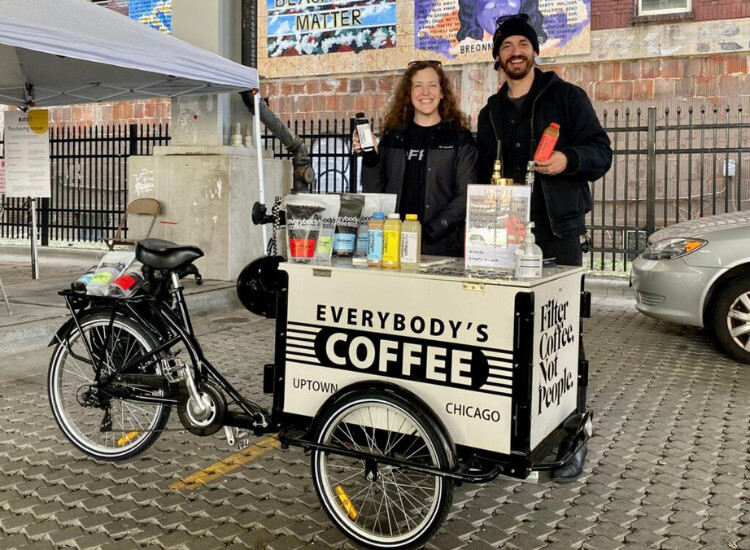
Everybody’s Coffee
Nestled within the vibrant and ever-evolving neighborhood of Uptown, Chicago, Everybody’s Coffee stands as more than just a coffee shop; it’s a haven of welcome, a hub of connection, and a catalyst for change. Founded on a rich history and guided by a passionate commitment to ethical practices, Everybody’s Coffee has woven itself...
Nestled within the vibrant and ever-evolving neighborhood of Uptown, Chicago, Everybody’s Coffee stands as more than just a coffee shop; it’s a haven of welcome, a hub of connection, and a catalyst for change. Founded on a rich history and guided by a passionate commitment to ethical practices, Everybody’s Coffee has woven itself into the fabric of the community, offering not just great coffee but also a place of warmth, diversity, and creativity.
The journey of Everybody’s Coffee commenced in 2009 when it was born as a small skateboard shop/café, forging connections within the Uptown neighborhood. The Uptown Chamber welcomed this new venture, marking the beginning of an impactful story. Initially, the focus was on skate culture, but five years later, a realization sparked change. The founders recognized the need for more space to connect with the community. Thus, in 2014, Everybody’s Coffee emerged across the street, blooming into a café, bakery, and food spot.
Central to this transformation were the five visionary founders, with Karl Sullivan taking the reins to christen the establishment. “Everybody’s Coffee” aptly mirrored the ethos of inclusivity that became the beating heart of the cafe. The aim was clear: a haven where everyone, regardless of their background or story, could find a warm welcome.
Beyond brewing the perfect cup, Everybody’s Coffee harbored a larger mission – to foster connection and creativity. The café was more than just a business; it was an embodiment of community values. Founded by a diverse group connected with the faith community, the cafe aimed to serve its neighbors in Uptown and beyond through coffee, relationships, and resources. Rich Troche, co-founder and general manager of Everybody’s Coffee shares, “Everybody’s Coffee was founded by a racially diverse group of women and men committed to helping our community through coffee, relationships, and resources. From our neighbors in Uptown to our coffee growing partners, our focus has always been relationships.” Strengthening these ties, Everybody’s Coffee partnered with Cornerstone Community Outreach, offering support to those experiencing homelessness. This association reflected the cafe’s unwavering commitment to give back and make a tangible difference.
This mission of connection and giving back is also reflected in Everybody’s Coffee’s choice in ethically sourcing their coffee beans. “Ethical and sustainably sourced coffee has always been a foundation of our cafe. Our journey towards roasting ethically sourced coffee began over five years ago. With one of our founders having roots in South America, initial connections with coffee regions were made through family visits. In 2018, we proudly imported our first crop of directly sourced coffee. This approach empowers us to unearth remarkable coffee varieties and stories while directly supporting our partners at origin. By investing in their businesses at the source, we are able to roast and share exceptional coffee with our community,” shares Troche.
Customers flock to Everybody’s Coffee not just for the quality coffee, but also for the inviting ambiance, friendly staff, and ever-changing local art galleries. The in-house creations, like the Thai Fighter iced coffee and the sausage, egg, and cheese biscuit sandwich, have become local favorites, enticing taste buds and creating lasting memories. Everybody’s coffee has expanded their presence beyond their walls by adding a dash of innovation to the mix by introducing a mobile coffee bike. This custom-made bike delivers cold bottled drinks and chilled coffee on tap, bringing a touch of caffeinated joy to off-site events, weddings, summer festivals, and farmers markets.
Reflecting on the journey, Everybody’s Coffee takes pride in navigating challenges, including the turbulence of the pandemic. “We kept our doors open and continued to serve take-out orders. It served as a bright spot in everyone’s day to have some human interaction. We strive to make everyone feel welcome and comfortable, and to make genuine connections with our customers,” shares Troche. Everybody’s Coffee holds an unshakable hope for Uptown’s continued success. As a bastion of diversity and inclusivity, the cafe aspires to be a constant source of light amidst the ever-changing tapestry of the neighborhood. The connections forged and the warmth shared during challenging times underscore the cafe’s determination to stand by their vision.
The future vision for Everybody’s Coffee is clear: to remain a cornerstone of connection within the neighborhood. As a place where everyone feels welcome, comforted, and heard, the cafe aspires to forge deeper, more meaningful relationships. Whether you’ve been part of the community for years or are just passing through, Everybody’s Coffee beckons, inviting you to make it your own. Uptown’s ever-evolving landscape provides Everybody’s Coffee with a unique backdrop to expand its “banner of welcome.” This diverse and bustling neighborhood not only supports the cafe’s mission but also challenges it to grow in harmony with the community’s history and future. A diverse clientele, from locals to tourists, find solace and connection under the café’s welcoming roof.
In the heart of Uptown, Everybody’s Coffee isn’t merely a coffee shop; it’s a testament to the power of community, a commitment to ethical practices, and an embodiment of a vision where coffee isn’t just a beverage—it’s a catalyst for human connection. So, whether you’re seeking a perfectly brewed cup or a genuine conversation, Everybody’s Coffee welcomes you, making the aroma of coffee inseparable from the warmth of community.
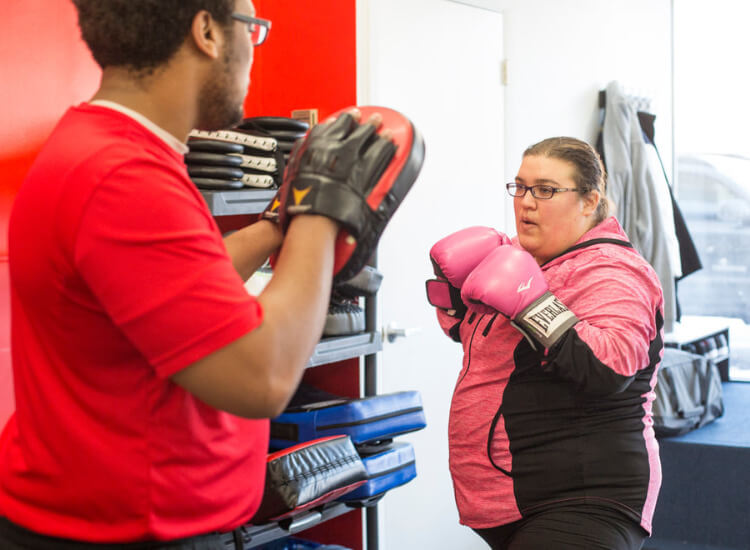
Mind Body Defense
Mind Body Defense (MBD) is not just another kickboxing studio. Led by Torriente Toliver and Janet Tolliver, Mind Body Defense has become a source of empowerment, resilience, and self-confidence. The unique fusion of martial arts, kickboxing, psychology, and community advocacy has set them apart, transforming lives within...
Mind Body Defense (MBD) is not just another kickboxing studio. Led by Torriente Toliver and Janet Tolliver, Mind Body Defense has become a source of empowerment, resilience, and self-confidence. The unique fusion of martial arts, kickboxing, psychology, and community advocacy has set them apart, transforming lives within their eclectic neighborhood.
A former high school English teacher, a martial arts master, and a Chicago native, Torriente Toliver opened Mind Body Defense in 2016, after struggling to find a studio that catered to his unique vision of martial arts education. With three black belts and over 25 years of martial arts experience, Torriente wanted a place that taught more than striking technique and grappling; he wanted to create a safe space for students to develop situational awareness, build confidence, and learn conflict resolution tactics. His wife, Janet, a freelance editor with a background in psychology, brings a different set of skills to the table. Beginning her kickboxing journey after meeting Torriente, she now lends her expertise to their business while also teaching classes. Mind Body Defense celebrated their seventh anniversary this July, inviting the local community to an open house event and to experience their unique approach firsthand.
Unlike standard fitness classes where everyone does the same exercise, Mind Body Defense promotes individual learning at its own pace, even within a group setting. The students often engage in completely different drills, depending on their abilities and progress. A strong focus on partner drills aids in the creation of a supportive, empathetic community, where everyone works together to become the best version of themselves.
For Torriente and Janet, MBD is more than just a kickboxing studio. It is a kickboxing and self-defense school that seeks to unlock students’ potential. They see self-defense as a unique expression of a person’s physique, aggression, and skills. Their mission is to collaborate with the community and professionals alike to support their clients and the Uptown community at large. Their vision extends to becoming a full-service wellness center, offering services that support their clients’ physical, mental, and emotional wellbeing. Mind Body Defense has made a notable impact on its clients, extending beyond physical fitness or weight loss. It has empowered individuals who were previously fearful of going outside at night, provided mental relief for those who have busy lives, and even helped people grow more comfortable with their bodies. The emotional resonance of MBD is strikingly evident, with students often comparing the classes to therapy sessions.
As a minority-owned business, Mind Body Defense has faced its fair share of challenges. From being overlooked to constantly having to negotiate rates, the journey has not been easy. Yet, they have overcome these hurdles by focusing on the positive impact they have on their students and the local community. The acceptance, appreciation, and support they receive from their students and the community far outweigh the rejections.
Being an Uptown Chamber member, Torriente and Janet appreciate the connections and growth opportunities the chamber offers. By participating in community events, they have managed to connect with community members and other businesses. Uptown, once just a neighborhood where Torriente and Janet resided, has become the community they cherish and serve. Amidst the changes brought about by COVID-19, the community has rallied together, supporting each other, filling empty storefronts, and becoming more engaged. In the face of an evolving neighborhood, Mind Body Defense offers a message of hope: “Any situation that makes you uncomfortable is a self-defense situation, and it’s better to have specific techniques, tools, and tactics to handle them than to rely on your instincts.”
In the future, Torriente and Janet envision their business growing into a full-service wellness center, catering to the physical, mental, and emotional development of their clients. With plans to incorporate yoga, meditation, journaling, and other therapeutic activities, they aim to become a haven for holistic wellness. Mind Body Defense stands as a testament to resilience, self-confidence, and empowerment, serving not just as a kickboxing and self-defense studio, but as an advocate for those in vulnerable situations. Through their journey, they have demonstrated that the essence of martial arts is more than physical—it’s about cultivating strength and resilience within oneself and the community.
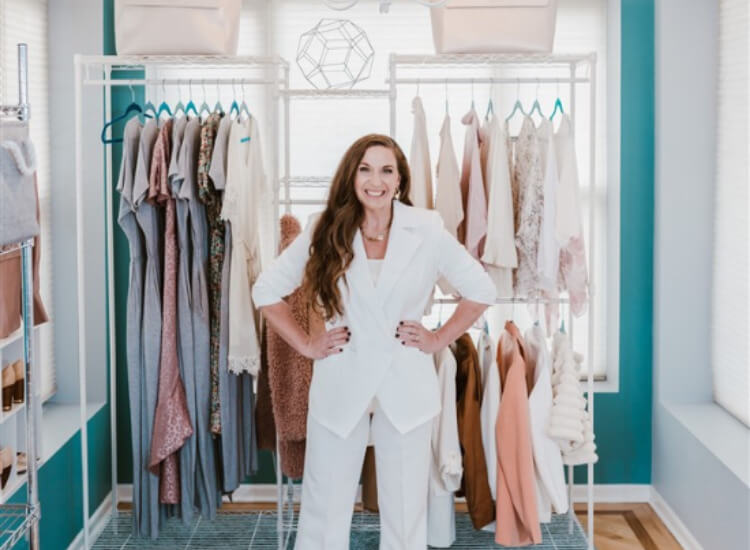
Shopping Girl XOXO
From the heart of Uptown emerges a stylist Lora LaPratt, the entrepreneurial force behind Shopping Girl XOXO (SGXOXO). A personal stylist with a unique approach to fashion, Lora transforms lives one outfit at a time, weaving together the threads of fashion, confidence, and individuality. Originally hailing from...
From the heart of Uptown emerges a stylist Lora LaPratt, the entrepreneurial force behind Shopping Girl XOXO (SGXOXO). A personal stylist with a unique approach to fashion, Lora transforms lives one outfit at a time, weaving together the threads of fashion, confidence, and individuality. Originally hailing from Michigan, Lora moved to Chicago over two decades ago, intending to stay for just a year. As fate would have it, she fell in love with the Windy City’s vibrant culture, and soon after, her husband, thus planting her roots firmly in Chicago’s soil. Today, she lives with her husband, toddler son, and fur baby, a family of four flourishing in this bustling city.
Lora’s journey into the fashion world was organic; her innate knack for styling drew friends and family to seek her advice. Pairing this with a passion for empowering others through fashion, she attained a degree in Fashion Merchandising and launched Shopping Girl XOXO. The initially envisioned side gig quickly evolved into a full-blown personal styling business, earning prestigious accolades, including being named one of the “Top Woman Owned Businesses” by Chicago View in 2016 and one of the “Power Moms of Chicago” by FETE Lifestyle Magazine in 2022.
What sets SGXOXO apart is its genuine dedication to inclusivity and local talent. Lora works with a diverse range of clients – from stay-at-home moms to busy professionals. She emphasizes supporting local designers and boutiques, giving her clients the opportunity to sport unique styles while uplifting small businesses in their community. The business’ underlying philosophy is simple yet profound: to help clients feel confident and stylish, ultimately enabling them to radiate the best versions of themselves.
The impact of Lora’s work extends far beyond fashion alone. She revels in watching her clients’ confidence grow as they discover styles, shapes, and colors that enhance their natural allure. The transformative power of a well-curated wardrobe is not lost on her clients, who, according to Lora, “open their closet doors every morning, excited to get dressed, step out the door, and take on whatever life throws their way.”
When asked about her accomplishments, Lora doesn’t hesitate to express gratitude for her dream job. However, the most significant challenge for her as a business owner has been striking the right work-life balance. As a woman entrepreneur, she acknowledges the hurdles but maintains a steadfast belief in her abilities. “I’m lucky to say that I have always been a ‘go-getter’ who doesn’t pay much attention to the doubters,” she says. The support from her family and the community fuels her unwavering dedication.
The last decade has seen Uptown bloom with diverse small businesses, a development Lora enthusiastically applauds. As an active Uptown Chamber member, she appreciates the camaraderie and business connections she’s made through community events and activities. Her message of hope to the neighborhood is simple and powerful: “Shop small, support local, be nice.” Through Shopping Girl XOXO, Lora LaPratt is not only reshaping closets; she is reshaping lives. She embodies the spirit of community, female empowerment, and local pride, and we look forward to seeing how she continues to elevate style in Uptown and beyond.
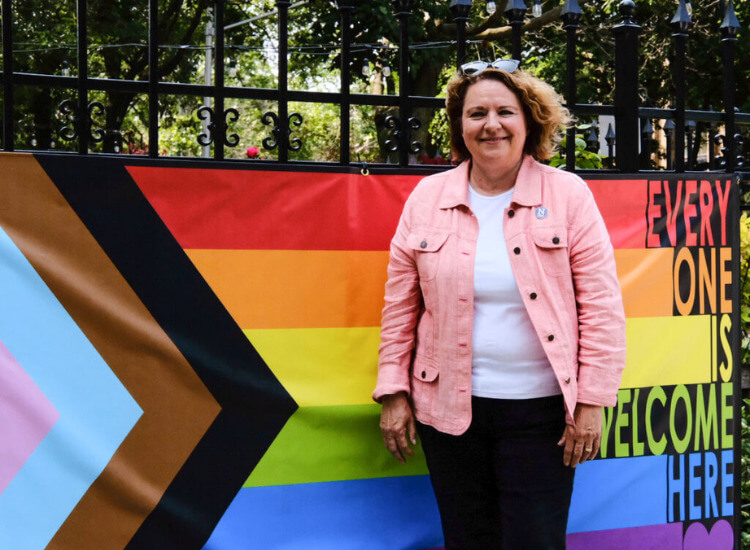
Sheridan Park Consulting
Jackie Loewe, Founding Partner at Sheridan Park Consulting, has been an Uptown resident for over 2 decades. Thirteen years ago, during the Great Recession, Jackie was an equity partner of a Landscape Architecture practice and oversaw bringing in new businesses to the area. Times were challenging and getting tougher, so Jackie decided to leave the practice to take...
Jackie Loewe, Founding Partner at Sheridan Park Consulting, has been an Uptown resident for over 2 decades. Thirteen years ago, during the Great Recession, Jackie was an equity partner of a Landscape Architecture practice and oversaw bringing in new businesses to the area. Times were challenging and getting tougher, so Jackie decided to leave the practice to take a break. A few months later, contacts in her industry asked for her help in training staff on how to enhance their outreach and connecting skills to ultimately bring in new clients. That’s when she realized there was a strong business need in Uptown and she possessed the skills and had the background to fill it. That was the birth of Sheridan Park Consulting, and thirteen years later, it was the best move she’s ever made.
At Sheridan Park Consulting, Jackie Loewe is the sole proprietor working exclusively with engineering firms, architecture practices and construction management companies, training technical people on how to be Firm Ambassadors in the larger Uptown neighborhood. “As the sole proprietor, it is helpful to have coffee shops and a walkable neighborhood so I can take a break from my home office and go out and connect with neighbors and other businesses…Uptown is a diverse, historic, welcoming, gritty, supportive, artistic, urban community working together to make room for everyone. There is so much growth and excitement going on here,” says Loewe.
It means everything to Jackie to be working and living in Uptown. The rich mix of everyone keeps challenging her to never get stale and find ways to appreciate differences. And living and working in an actual historic district means these buildings will be preserved forever. It is why Jackie named her business after her community: Sheridan Park.
As someone who has been in the business world for over 35 years now, challenges in appreciating differences were much more present. “When I started my career, I could have been legally fired for being a lesbian, so I was not willing to be “out” then. As a lesbian, it is wonderful to meet and know so many other business owners with whom I have common ground. The LGBTQ+ community knows the importance of supporting each other. Many years ago, it meant the difference between surviving or not,” says Loewe. Jackie shares that she puts my Pride Flag out in front of her home as she wants people to know she’s here and that she’s supporting diversity in Uptown. Seeing so many others with expressions of Pride throughout Uptown brings her so much joy.
As a business owner now, Jackie’s challenges are not tied to being a lesbian, but challenges are the same as every other business owner—keeping the pipeline full of new clients and generating consistent revenue. Jackie shares that she has learned many lessons from watching other businesses thrive. She enjoys talking with like-minded business owners who may be experiencing some of the same challenges as her. In addition, Jackie believes “the Uptown Chamber has been and is an incredible resource of best business practices, how to navigate city permitting and helping to find funding options. The Chamber is incredible about creating ways in which we can all come together.”
As an inspiring individual who has lived and worked in the community for many, many years now, and leading Uptown United’s board of directors as Board Chair, Jackie’s vision and hope for not only her business, but also the Uptown community as a whole: “Uptown is unique, growing and thriving while still maintaining its diversity. I can’t wait to see what the future holds for our incredible community. I love what I do. I help people become confident in their ability to connect with other people. I just want to keep on doing that.”
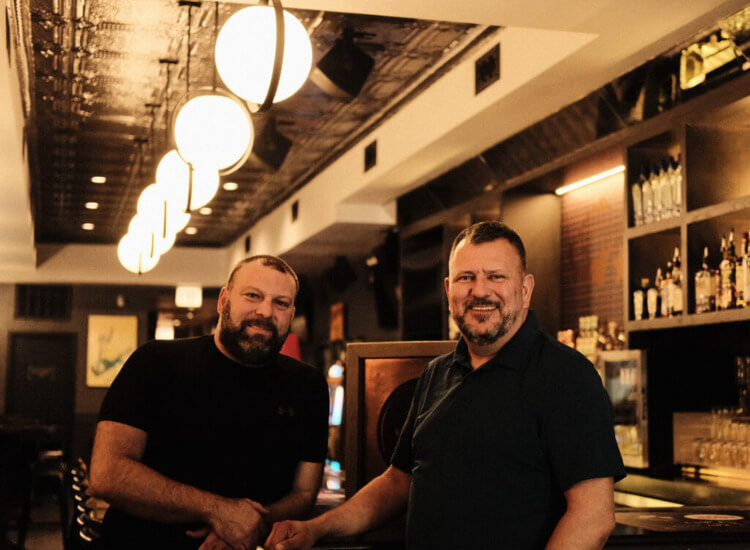
2 Bears Tavern
Mike Sullivan and Mark Robertson, co-owners of 2Bears Tavern Group, which owns and operates four LGBTQIA+ focused taverns in Chicago –2Bears Tavern Uptown, Meeting House Tavern, The SoFo Tap, and Jackhammer—have been in the hospitality businesses since 2010 after spending time as a lawyer and CPA respectively. Mike and Mark’s first...
Mike Sullivan and Mark Robertson, co-owners of 2Bears Tavern Group, which owns and operates four LGBTQIA+ focused taverns in Chicago –2Bears Tavern Uptown, Meeting House Tavern, The SoFo Tap, and Jackhammer—have been in the hospitality businesses since 2010 after spending time as a lawyer and CPA respectively. Mike and Mark’s first venture, Crew Bar + Grill, was located at the intersection of Lawrence and Broadway, but since it closed, they had a desire for another bar concept on top of their already existing businesses. When the former Nick’s on Wilson space became available during COVID, they felt it was the perfect spot. “The transformation of the Broadway/Wilson area of Uptown over the past 5 years has been amazing. With a first-rate CTA station, Truman College, and more than 1,000 new residential units in the immediate area, it is a great place for a neighborhood LGBTQIA+ tavern. The area has already seen several new retail and entertainment projects, including the Baton Lounge, Double Door, and Chicago Market–a cooperative grocery–joining great retail and dining options along Wilson Avenue,” says Sullivan.
Uptown is home to both the owners. It’s also one of the most diverse neighborhoods in the city, both in terms of its residents and its businesses. It’s a success story as to how a neighborhood can be a diverse, vibrant, and welcoming community. Sullivan and Robertson are excited to help be a part of Uptown’s renaissance and it reflects in each of their businesses. “Each of our taverns has its own vibe, but our overall business model is to create safe spaces for our communities to come together and find a relief valve of the outside world. 2Bears Uptown is designed to be a neighborhood LGBTQIA+ gathering spot, but of course we welcome everyone so long as they respect our community and our space. Many of our customers that have come from our other bars have commented on how different the feel of 2Bears Tavern Uptown is. That’s what we were going for: relaxed/no attitude environment, upscale design but not pretentious, good value and that “Chicago neighborhood bar” vibe,” says Sullivan and Robertson.
Like many businesses, navigating COVID was both Sullivan and Robertson’s biggest challenge and greatest accomplishment. They were able to keep much of our back of the house team employed for all of COVID even though all of their bars were closed for at least 15 months. The owners were also able to provide financial support and meals to their team during the early part of COVID before the government support programs got underway. And they had so much support from customers and the community for their community meal program that they were able to extend it to 2 days a week and invite anyone in the community who needed a meal to come by, for an extended time during the pandemic. None of this was without sacrifice as the owners, but it also gave Mike and Mark a newfound appreciation for their role in building sustainable communities; small businesses all over Chicago were stepping up to do what they could to hold onto our communities.
The support from the community has been amazing, as has the support and help of the chamber and the alderman’s office. Everyone the owners have interacted with seems keenly devoted to making Uptown succeed and grow. “The chamber is a great resource for information about opening and operating a business, navigating city rules and regulations, and getting the word out about what you are and what you offer. It has helped promote and grow its diversity and bring new businesses to locations throughout a large neighborhood with several distinct business districts,” says Sullivan and Robertson.
Beyond these challenges during COVID, Sullivan and Robertson mention that despite being in Chicago and Illinois, where LGBTQIA+ people have strong legal protections and an overall welcoming city, discrimination abounds. “We have seen discrimination by banks, insurance companies, government agencies providing COVID relief, and countless vendors and contractors. Getting our bars open was delayed for many reasons, but having contractors who would bid on a project and then ghost us once they figured out we are an LGBTQIA+ business was a major obstacle,” says the owners.
Both Sullivan and Robertson believe that now more than ever, it is vital that LGBTQIA+ people stand up, loud and proud. “After a long run of progress and success, there are nationwide efforts to take away our rights and put us back in the closet, especially transgender people. As part of Pride Month, we issued a Statement on Allyship and Safe Spaces, which really captures what we believe. It’s at https://2bearstaverngroup.com/news/on-allyship-and-safe-spaces,” share Sullivan and Robertson.
As Mike and Mark continue their journey in opening inclusive, diverse, and innovative social spaces in Uptown, they hope to add to the diversity of the community and help make it an even better place to live, work, and play. Safe spaces for the LGBTQIA+ community are as important as ever and they both feel strongly that such spaces lend to the strength of the community. “We are adding to the beautiful mosaic that is Uptown. It feels comforting to walk around the neighborhood and see people of so many different backgrounds, hear people speaking in many different languages, finding their community in Uptown. Thank you for your support. We hope to see all of you at 2Bears Tavern Uptown and we hope to be here in 20 years pouring drinks into cups and providing a safe and fun space for everyone.”
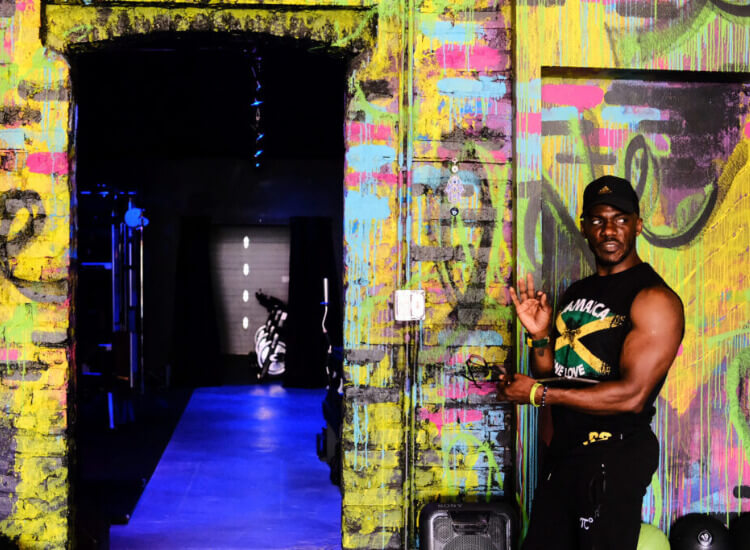
Bodi Shak
Antonio Coke’s journey to opening Bodi Shak was a long winding one with many turns and pivots, not a direct route to what he’s created today. It was the culmination of the ebbs and flow of his life experiences that brought him to creating his business in 2017. Originally hailing from Montego Bay, Jamaica, Antonio’s mother, Viola, immigrated with him and his siblings to...
Antonio Coke’s journey to opening Bodi Shak was a long winding one with many turns and pivots, not a direct route to what he’s created today. It was the culmination of the ebbs and flow of his life experiences that brought him to creating his business in 2017. Originally hailing from Montego Bay, Jamaica, Antonio’s mother, Viola, immigrated with him and his siblings to the US to provide them a better life. Entering this new environment, this new culture was challenging for a young Coke as he was always a quiet, timid child, often facing self-confidence issues. Despite this, he was always contemplative and intuitive of his purpose in the world. Like so many of us that grow and stray away from our childhood dreams and aspirations, Antonio found himself studying business management. “It sounded good, it sounded safe rather than recognizing that I’ve always been good and excelled at art, you know, drawing, painting, creating…but I never thought to lean into that space,” says Coke. But ultimately Antonio did lean in and pursued a Master of Science in interior design at Pratt Institute in New York City. Following his calling into the art and design world, Antonio believed he was on the path that he always desired, but “back in the mid-90’s as I was on the cusp of finishing grad school, I joined a gym and walked into a group fitness class, and it literally changed my life,” Coke states.
When Antonio first entered fitness, he feared even entering the room. Self-doubt and shyness plagued his mind, but he walked in anyway, stood in the back, did what he could. After this experience, he found himself wanting to go back. That he did, and over time, Antonio eventually found himself not only attending fitness classes, but leading them. “Even in the many years that I was a leader in it, I’ve always felt like I didn’t belong in front of people. You know, I would be petrified.” But his intuition and contemplation of his role in life triumphed over this fear; the mindset that Coke had, which was strongly to help people, to make a difference. “People kept saying, you are good at what you’re doing, but for me that question came into being, what does that mean?”, stated Coke.
In reflecting back at this question, Antonio mentioned the many aspects that impacted where he moved from that point. “You know, when life presented my partner, it was a big eye opener for me because I felt I was about to go on this journey with this human being, and I felt I needed to rise up in receiving that gift,” says Coke. He also reflected on receiving the gifts from his mother, from God. “How do you move forward in honoring being Viola’s son, honoring all the women who raised me, being a child of God…it was all those elements truly that pushed me.” Rising up to the occasion and honoring the past pushed Antonio into the mindset that he was meant to do something. “I knew there was a craving that I would say that was innate in helping people, but I didn’t know that my design skills coupled with my love of fitness and my love of helping people would become Bodi Shak many years later. It was purposeful,” Coke says.
In 2017, Antonio Coke opened Bodi Shak in Uptown. Uptown naturally chose Bodi Shak because when Antonio created it, he didn’t want it to exist where everybody else was – downtown Chicago congested with boutique fitness and big box gyms – but rather in a space that needed it. “I moved to Uptown but didn’t even consider Uptown…I didn’t even want to move Uptown because until then I had lived only in downtown Chicago, so Uptown really chose Bodi Shak, and it organically was born in my backyard and proven to be the perfect space because I knew that again Bodi Shak was going to be something unique. It’s something special, and Uptown is hugely diverse, hugely inclusive, and it made perfect sense for Bodi Shak to be born here,” shares Coke.
When the pandemic hit only a few years later, Antonio was faced with a life changing decision like so many he’s faced in his past. Gyms were closing, and like many other businesses, it was hugely difficult running a business during the pandemic. On top of that, Coke lost his mother Viola during the pandemic, and he saw it as his way out of the business. “Why do it anymore? Mom is gone. I was uninspired, but what I recognized more than ever in that moment Bodi Shak was needed…the intersection of one, haven given up, and two, recognizing that it was a sacred space…at a certain point I dove in because it’s like we’ve come too far…your mother made this huge sacrifice getting her children from Jamaica to experience a whole better life in this country, so honor that,” Coke shares. These thoughts and reflections urged Antonio to continue Bodi Shak. Bodi Shak not only remained open, but they decided to expand and move away from their original location on Broadway to North Clark Street. “So, we end up finding this magical space on N. Clark St, just six blocks from where we were, not thinking that anyone would come…this space was too far…and I also went back to that interesting mindset, thinking that I could not transform this box that I found into something magical that people would also want to experience. I was wrong,” reflects Coke.
When you walk through the doors of Bodi Shak’s new location on 4609 N Clark Street, you are greeted with these beautiful botanicals that Antonio says all represent the women who raised him, and it’s the first thing that gets you a hug and welcomes you into the space. Antonio Coke has created a magical space that honors his past, his love for design, and passion to help individuals. Bodi Shak’s slogan is Find What Moves You. Antonio Coke reflects and shares his process and journey by ending with: “You can’t undo anything, but you can take all the lessons that life and the journey that life takes you on and use it to your forward movement in any way. I feel like you’re always evolving and growing into who you’re eventually becoming. Find what moves you…and then share it, figure out a way to share it because everything that you do will directly impact someone else’s existence.”
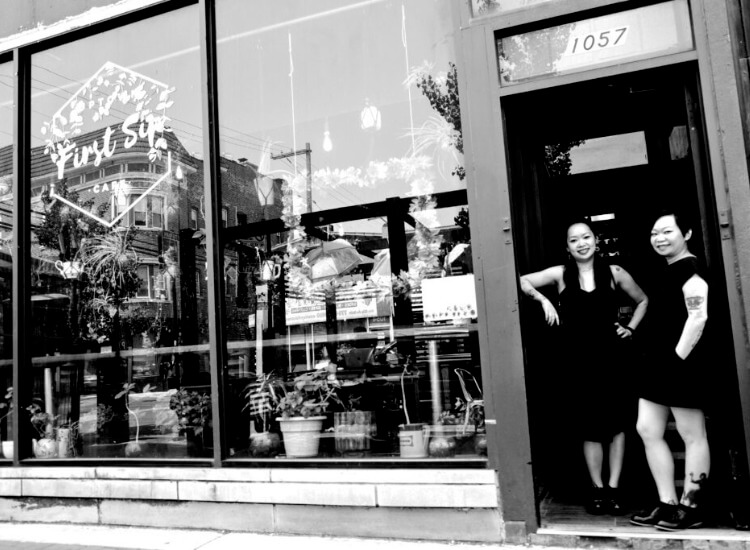
First Sip Cafe
Erin and Gigi Hoang immigrated with their family to Chicago from Vietnam in 1997. Uptown, being a port-of-entry for many immigrants and refugees throughout the decades, and Argyle Street specifically for predominantly Southeast Asian populations, soon became where the Hoang family found community and home. After working several years...
Erin and Gigi Hoang immigrated with their family to Chicago from Vietnam in 1997. Uptown, being a port-of-entry for many immigrants and refugees throughout the decades, and Argyle Street specifically for predominantly Southeast Asian populations, soon became where the Hoang family found community and home. After working several years in other Vietnamese restaurants in Uptown, Erin and Gigi’s parents decided to open their own restaurant along the corridor. Café Hoang Restaurant, opening in 2000, showcased Central Vietnamese Hue cuisine. The sisters, along with their other siblings grew up working in the restaurant. “We both grew up on Argyle and have always loved Uptown…Argyle and Uptown has been home to Gigi and I since we immigrated to Chicago,” says Erin.
Despite growing up in the restaurant and service industry, the Hoang sisters followed their own career paths before deciding on opening a coffee shop in the area. Erin graduated from DePaul University with a bachelor’s degree in marketing and accounting and worked in a start-up. Gigi obtained a BS and a MS in Mathematics from DePaul and Roosevelt University, respectively. After graduating from her master’s program, Gigi returned to Café Hoang to help. That was when the sisters noticed a potential need for a coffee shop on Argyle. With its proximity to the Red Line, music venues, and the lake, the sisters felt they could fill a void along the corridor by opening the first coffee shop. Erin mentions that after noticing the empty store fronts on Argyle, the sisters “felt it would be a good opportunity for us to be the first coffee shop in the neighborhood. So, we made a sister’s pact of If you do it, I’ll do it. We both opened First Sip Café in November 2017 without any prior café or coffee experience or savings.”
Erin and Gigi were one of the first 2nd generation AAPI business owners in the Asia on Argyle corridor. The sisters believe that as 2nd generations business owners, they bring positive change for the future while still trying to pay homage to the people and community here prior to them and currently. It’s working with the younger generations and new businesses but still supporting and looking out for the older mom-and-pop shops; making sure everyone is getting taken care of. The Hoang sisters have not only slowly risen to become community leaders in the area, but they have also created a community and meeting space for folks to socialize, study, do work, and organize. Their creativity and leadership have drawn both old and new customers to the area. If you enter on any given day of the week, you’ll notice people from all walks of life, generations sharing space and connecting. Without AAPI business leadership like the Hoang sisters have shown, we would lose out on a lot of the cultural history, traditions, and perspectives on how business is operated.
Beyond bridging the generational cultural gap through business and commerce, the sisters shine bright in their creative drinks which have customers always coming back to support. “We love to experiment with different flavors to pair with coffees and teas—we have a spicy mango latte with cayenne or the pearl noir, which is a tea latte with charcoal, coconut and jasmine flavors,” says Erin. As First Sip Café is soon approaching 5.5 years, Erin and Gigi stated that they are so proud of the community that they have built with the kindest, most creative, and smartest folks. As they move towards 6.5 years, the Hoang sisters hope to continue growing with the community and hosting more events the is engaging and impactful. For any 2nd generation AAPI entrepreneurs that hope to carry on the cultural legacy of Asia on Argyle and may one day hope to open a business, the Hoang sisters share, “If our parents immigrated to a new country without savings or knowing the language, then we can take the risks too.”
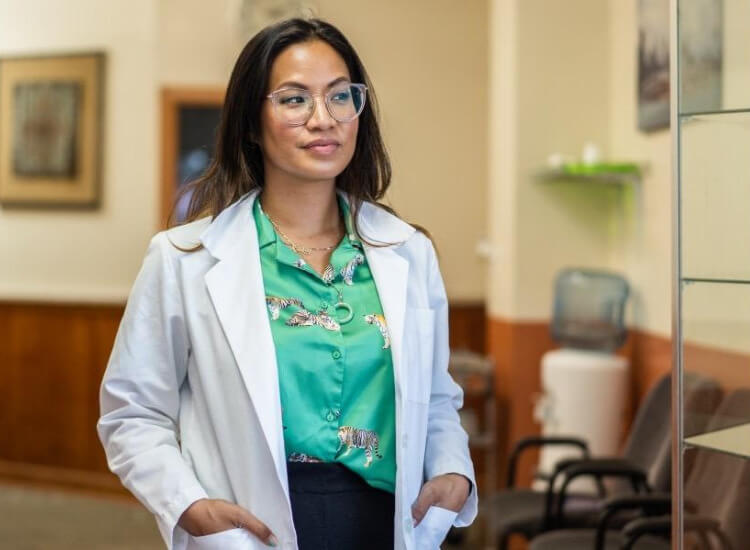
Mini Tx (Thuong Xa) Pharmacy
Jennifer “Nuky” Pham is the co-owner of Mini Tx (Thuong Xa) Pharmacy and a daughter of Vietnamese Refugees. Jennifer’s parents, Nam and Tam Pham, were the first Vietnamese business owners on Argyle Street. Her father, Nam Pham, was a pharmacist in Vietnam, but in 1975 after the fall of Saigon, had to flee...
Jennifer “Nuky” Pham is the co-owner of Mini Tx (Thuong Xa) Pharmacy and a daughter of Vietnamese Refugees. Jennifer’s parents, Nam and Tam Pham, were the first Vietnamese business owners on Argyle Street. Her father, Nam Pham, was a pharmacist in Vietnam, but in 1975 after the fall of Saigon, had to flee and start anew in Chicago. Nam started working at a local pharmacy close to Truman College and would translate the prescriptions to Vietnamese for other refugees during the time. He saw a need to have a pharmacy specific to the refugee community, so he, along with Jennifer’s mother, Tam, and their friend opened Saigon Pharmacy on Argyle in 1980. Later, in 1983 they moved down the street to its current location at 1069 W Argyle Street as Mini Thuong Xa Pharmacy.
Because of the influx of Southeast Asian refugees, they knew they needed to create a place for refugees like themselves to have access to services and a need to build community. Now a pharmacy, the business originally started as a mini mall (thương xã) that housed the pharmacy, a doctor’s office, a video & music store, jewelry shop, film development store and later included karaoke systems, travel agency and more. It was a place where mostly Vietnamese and other Southeast Asian folks came to pick up their medicine but also a place to make friends, build community. It was a one stop shop that felt like home. Through the years, they let go of the other aspects of the business and ran it solely as a pharmacy. In 2014, as Jennifer’s parents were contemplating selling the pharmacy to a larger corporation, she felt she had to step in and take over to sustain this legacy business that has been so crucial to so many Vietnamese and other Southeast Asian clients.
This idea of returning to Argyle was never in Jennifer’s plan. To her, Argyle has always been a place she knew as home, but also a place she tried to run from. Through the years Jennifer realized how much the pharmacy meant to her, her family, and the community. As a second-generation business owner, there is a continuance of legacy, history and quality community care. Because Mini Tx Pharmacy is a small local pharmacy, they can focus on the quality of care their patients need. “We speak three languages here — Vietnamese, Cantonese, and English. We know folks here by name not just an RX #. Many of our patients have been coming here for years including their family members,” says Pham.
As Jennifer has carried on the torch of her parents’ hard work and determination into the future, she has also risen as a local community leader in the area. “I’m passionate about the growth, healing and positive community impact of Argyle,” says Pham. She not only co-owns Mini Tx Pharmacy with her business partner/head pharmacist, Thoa Bui, she has taken active community leadership roles as she co-founded community organizations, HAIBAYÔ and Celebrate Argyle. Jennifer mentions:
As Asian American, we were taught to keep our heads down, work hard and not speak up. To now have AAPI leadership within the business community it is about creating a new culture of business. As diverse as the AAPI community is, our ideas and perspectives are just as diverse and unique. We come from all types of backgrounds bringing something new to the table. As an AAPI owned business and entrepreneur, my word of advice is to lean on the community. Speak up, share your story, struggles and creativity. Your healing is sometimes your calling. Ask questions and learn. Many times, you will find that your story will also inspire others. Allow your ideas to flow freely and just go for it!
As carrying on the legacy of her parents drew her back to the area, the visions of the potential future for Argyle push her forward. Jennifer’s vision and hope for her business is to see it grow and continue to serve the community for years to come. “I love the community engagement here; we care and want the best for one another. I have felt supported as a business owner. The chamber, local organizations and community members have helped to keep our small business alive. I hope to see continued community engagement and support. I see a bright future for us.”
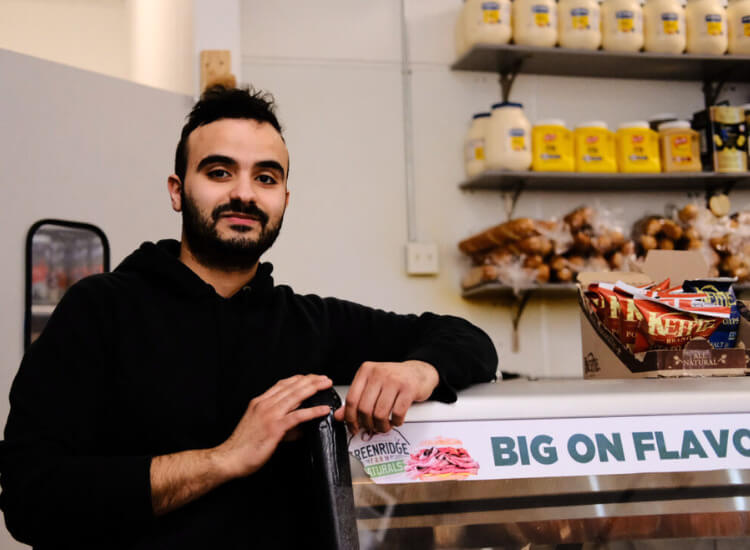
Uptown Deli
Mohammed Abuhashish, the owner of Uptown Deli, located at 4759 N Sheridan, has always called the Northside of Chicago his home. Mohammed’s father came to Chicago with his older brother from Jordan when he was 12 years old. Years later, his parents met in the city, got married, and welcomed Mohammed into the world. They always lived...
Mohammed Abuhashish, the owner of Uptown Deli, located at 4759 N Sheridan, has always called the Northside of Chicago his home. Mohammed’s father came to Chicago with his older brother from Jordan when he was 12 years old. Years later, his parents met in the city, got married, and welcomed Mohammed into the world. They always lived throughout different neighborhoods on the Northside, with Uptown being one of them, but after years of moving around, Mohammed decided to move back to Uptown because of the love he felt from the community and all the excitement the neighborhood had to offer. After several years back living in Uptown, Mohammed wanted to open a business to offer the neighborhood something he loved and felt that was missing. After noticing a vacant storefront at the corner of Lawrence and Broadway, surprisingly the same location where his father ran a business during the mid-90s before selling it in the early 2000s, he felt the timing was right to open Uptown Deli.
Like his father before him, and like many other immigrant entrepreneurs, Mohammed felt the importance of having minority leadership in the business community. It opens the door to new ideas as well empower other minorities that they can follow their dreams and do anything they put their minds to. As a second generation Jordanian American, Mohammed felt this empowerment as he pursued his entrepreneurial journey. It did not come with early challenges though. Mohammed mentioned that his “biggest challenge in owning a business was getting started. The first years I felt I would go out of business due to not having enough customers. But as time went on, I grew close with those here in Uptown and feel my business has become a staple in the community.” The challenge of opening a minority business is having an idea of what you want your business to be while also matching the needs of the community, Mohammed mentions. Initially, he did not understand the needs of the community, but he stated he overcame this challenge by interacting with the customers daily which helped him and his business to better understand what they need and want from his business.
Building relationships with the larger community helped Mohammed overcome the early challenges his business faced, and he continued building those relationships through his membership in the Uptown Chamber of Commerce. “Being a member of the Uptown Chamber has helped my business as I have been able to network with other leaders in our community as well as using those leaders as a sounding board for questions or ideas I may have about my business,” says Mohammed. He feels that the greatest impact the Uptown Chamber has made for the larger community is in the way they support small businesses…they also coordinate community gatherings and fundraisers that benefit the community as a whole. This ethos of community impact lives and breathes within Mohammed’s own business practices. According to Mohammed, his biggest accomplishment was during the peak of the COVID outbreak. Big name stores had run out of masks and cleaning supplies but through Uptown Deli, he was able to supply these vital resources to the Uptown community, specifically to the elderly community. Mohammed felt a sense of pride in being able to provide for the community.
As a lifelong Northsider, Mohammed has witnessed and experienced the changes of the neighborhood. Mohammed states, “It seems there are more people investing in our community whether that be renovating existing historical buildings, more green spaces, or more people moving to the neighborhood. It’s only up from here for Uptown! My hope for my business is to stay in Uptown and serve the community for many years to come. Maybe one day when I have kids, they can take over the business from me and continue to serve the community.” If you’re in the neighborhood and looking for a business with great customer service, unique products, and fresh produce from all over the world, and deliciously crafted sandwiches, stop by and say hello to Mohammed at Uptown Deli.
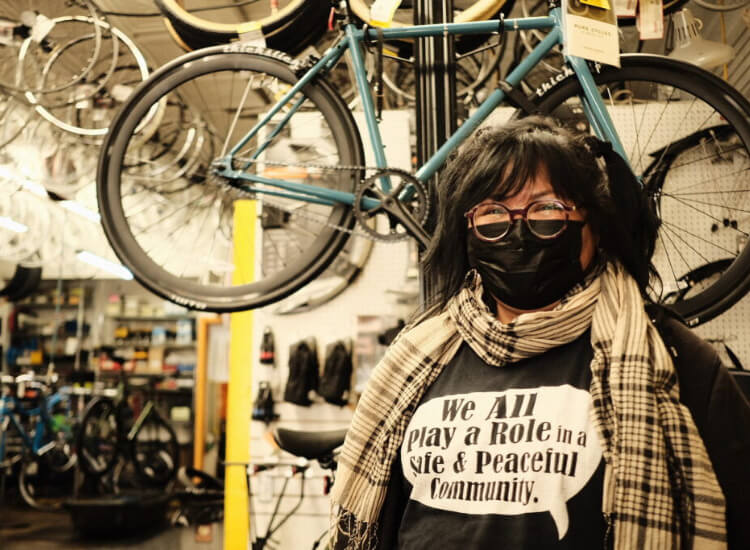
Uptown Bikes
Maria Barnes’ Uptown story began in 1991 when she arrived to work as a volunteer at REST Shelter through Passionist Lay Missioners. Following her year of service, Maria prolonged her stay and eventually made Uptown her home. Uptown Bikes, originally known as Urban Bikes, would open its doors two years later in 1993 by Maria’s partner, Tim Herlihey. Originally located at...
Maria Barnes’ Uptown story began in 1991 when she arrived to work as a volunteer at REST Shelter through Passionist Lay Missioners. Following her year of service, Maria prolonged her stay and eventually made Uptown her home. Uptown Bikes, originally known as Urban Bikes, would open its doors two years later in 1993 by Maria’s partner, Tim Herlihey. Originally located at a small storefront on Leland Avenue, they eventually moved around the corner to 4653 N. Broadway in 1996 after purchasing the building. Maria officially took reigns of the business as Tim retired in 2004.
What originally kept Maria in Uptown was its diversity. The 4600 N Broadway block where Uptown Bikes is located is a microcosm of the neighborhood’s larger mosaic. The block alone is home to long-time immigrant, family-owned businesses –from Dalia to Afrikiko to Gigio’s. Even the newcomers to the block – Sky Beverage Depot and In-On Thai – are immigrant owned businesses. “The uniqueness of this block and my business as part of this community is that we’re all people of color, we’re immigrants, we have independent family businesses, we really know our neighbors and our fellow business people, and our customers, of course. Everybody’s product caters to our community,” Maria states.
Uptown Bikes is women owned, women led, which adds another layer of diversity to the block. “I think it’s important for people to see us because we make up a good chunk of the customer base. It is good to have representation,” says Barnes. Maria and her team—Leah and Nina—are hyper focused on customer accessibility and customer service and try to provide value to their customers. They strive to develop relationships in order to create customer loyalty, which defines the culture at Uptown Bikes. Maria believes that women owned, women led businesses “offer a different customer experience to people in terms of retail and leadership. Women business leaders have a vision that is holistic; we try to understand why things are the way they are and try to change things that need to be changed. Our business has adapted and flowed with the changes of Uptown.”
As a resident and business leader of over 30 years, Maria has experienced Uptown’s changes and the challenges that come with it. From demographic shifts to the Wilson Red Line reconstruction project to COVID-19, Maria has had to not only internally acclimate to the trials and tribulations that impacted her business, but also build partnerships and collaborations in order to sustain. As an Uptown United board member and an Uptown Chamber of Commerce chamber member, Maria believes that both organizations are a great resource in terms of really promoting businesses, and creating vast outreach to people that normally wouldn’t view Uptown as a destination. As the Uptown Chamber of Commerce celebrates its Centennial celebration this year, Maria states, “great accomplishment to be to be relevant for 100 years and my biggest wish for the Chamber is that they continue to strive to be relevant in the changing community and really focus on thoughtful business development and continue to support small independent businesses, specifically those owned by people of color and immigrants.”
When posed with the question of what she hopes for Uptown’s future, Maria reiterated the idea of what kept her in the neighborhood so many years ago. “I want to see more people of color move to Uptown. I want to see the people of color that have lived here for generations, stay. People always describe Uptown as diverse. Any kind of power in the way a neighborhood develops, the focus should be on how we keep our immigrant, people of color population from all economic levels here and support it. That is really how you can then earn that designation as being diverse. I hope that people who come to this community grow when they get here; just opens their minds and hearts to cultures, stories, and histories of other people.”
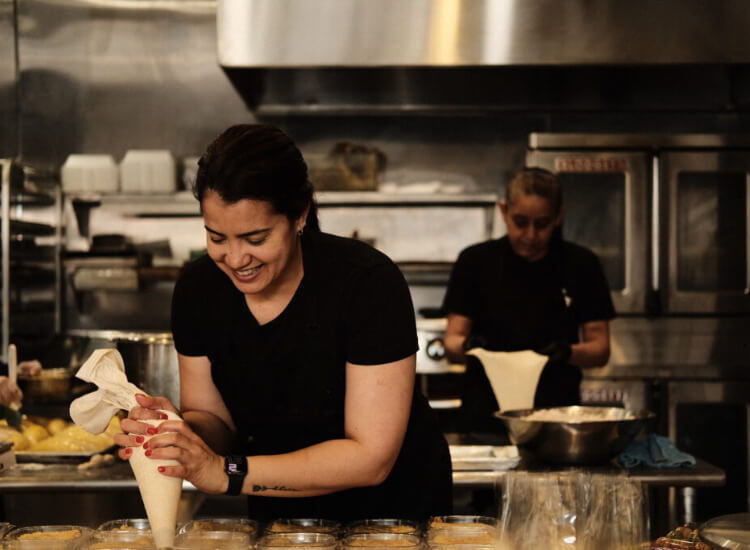
Klein’s Bakery
Jessica Klein’s baking journey began long before opening the doors of Klein’s Bakery in Uptown’s Buena Park neighborhood. Raised by her grandmother who owned a bakery in Venezuela, Jessica and her sister learned the craft of baking at a very young age. Although Jessica was a dentist back in her home country and her sister an accountant, upon arriving to the U.S. they...
Jessica Klein’s baking journey began long before opening the doors of Klein’s Bakery in Uptown’s Buena Park neighborhood. Raised by her grandmother who owned a bakery in Venezuela, Jessica and her sister learned the craft of baking at a very young age. Although Jessica was a dentist back in her home country and her sister an accountant, upon arriving to the U.S. they had to shift careers. Moving to the U.S. in 2015 and making Uptown their home, they worked their way through the food service industry at local favorites North Buena Wine & Deli and Michael’s Pizzeria. After two years, Jessica and her family realized their dream and opened the doors of Klein’s Bakery 4155 N Broadway N. Broadway.
Jessica would always pass the corner of Buena and Broadway and notice the empty storefront and she knew that the location would be the future home of Klein’s Bakery. “We started looking for a place and this corner was empty, we saw this place available, and I wanted to stay here. I lived at Hazel and Buena and I never checked out any other neighborhood…its the only place that we knew since we moved here, so we feel like family, you know?,” says Klein.
Upon entering the café, you’ll notice that the menu offers American breakfast menu items alongside Venezuelan specialty pastries, cakes, and desserts. “Mostly in our dessert area, they are all inspired by the Venezuelan culture”, says Klein. What you’ll see is cachito, a savory pastry stuffed with ham, cheese, and often times turkey, usually eaten for breakfast back in Venezuela. They also offer golfeados, a cinnamon roll type dessert with a bed of cheese and anise seed on top, and a Venezuelan variation of tres leches cake. These items have become very popular in the neighborhood with many non-Venezuelans always picking up cachitos and golfeados for the go or dine-in. “We are very proud of brining your culture because Venezuelan culture wasn’t well know here in the U.S. until about five years ago…not many people knew about Venezuelan culture and food…we were one of the pioneers, one of the first businesses that opened and offered Venezuelan food,” says Klein. Customers, old and new, always are eager to try new Venezuelan pastries Jessica puts on the menu, and that level of support has led to Klein’s Bakery’s success in the neighborhood.
Although the café is thriving now, it did not come without challenges. Being not only immigrants, but also women moving to a new country, along with COVID-19 for the last few years, it took extra determination to succeed. Jessica believes that you need to find yourself encouraged to do it, to be strong and capable of doing everything and face each obstacle you may face. “Nowadays in this society, we get to prove that as women we can do everything. Not only as a Latina owned businesses, but as a women owned businesses to show that we can empower every other woman that wants to be an entrepreneur that it is possible and you can do it,” says Klein. Jessica often shares this encouragement to her female staff as always tell them that if they have a dream of becoming an entrepreneur, of opening a business, is to do everything with love. Love what you are doing and if you do it with love, and you are constant and with discipline, you can achieve everything; just believe that you can do it and never give up.
Jessica Klein never gave up and her business is a mainstay in the Uptown, Buena Park community that she calls home. What she loves about the Uptown community is people’s commitment to their neighborhood. As a chamber member since her business’ inception, she underscores this support as the Uptown Chamber and Uptown United has always “supported us since we opened…they always promote us on social media, which helps us a lot because you get people in the community to know about us,” says Klein. As the Uptown Chamber approaches 100 years, Jessica wishes for its continued effort to make Uptown a great community and to improve every single year. It is working with businesses like Jessica’s that make Uptown the beautiful mosaic, vibrant, and thriving neighborhood that it is. Be sure to stop by Klein’s for their delicious Venezuelan pastries!
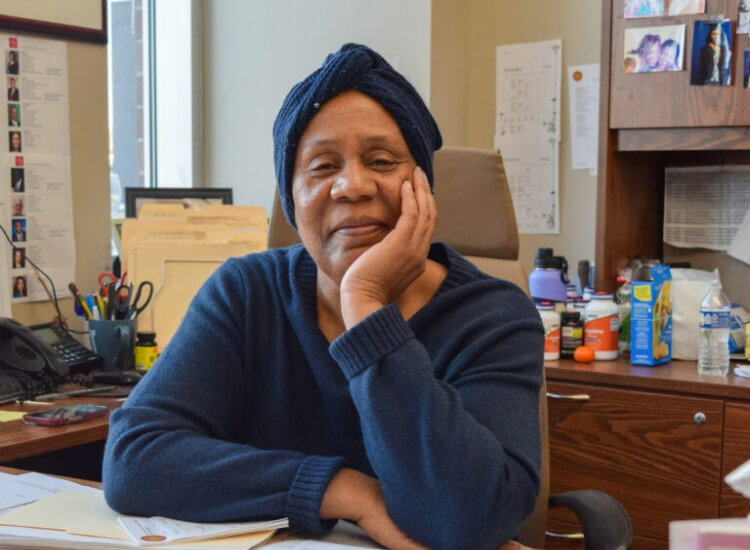
Black Ensemble Theater
“Black history is American history. African Americans developed this country on our backs for free, for over 300 years. That’s three centuries”, says Jackie Taylor, the founder, executive artistic director, and CEO of Black Ensemble Theater. She founded the Black Ensemble Theater 46 years ago after spending time in the film industry. In 1975, while starring in...
“Black history is American history. African Americans developed this country on our backs for free, for over 300 years. That’s three centuries”, says Jackie Taylor, the founder, executive artistic director, and CEO of Black Ensemble Theater. She founded the Black Ensemble Theater 46 years ago after spending time in the film industry. In 1975, while starring in the film Cooley High, Jackie Taylor was propelled into the international film arena during what was known as the Black exploitation era where a lot of African American films made were full of degradation to Black culture; full of violence, full of negativity and lies. “When I made Cooley High, I thought that it was a breakthrough movie…and that was the kind of movies I thought I was going to make, however, the industry did not have that mind,” said Taylor. Jackie was an educator and had taught thousands of young people about loving themselves and the greatness within themselves and she felt that if those youth had seen the type of films the industry wanted for her, the youth would not be able to tell the difference between Miss Taylor the actress and Miss Taylor the teacher. That would have destroyed everything that she had done in terms of trying to motivate her young folk to do better and make better decisions in their lives. Although the door closed on her aspirations in the film industry, she knew she had to do something else. “I decided I was going to start a theater because that’s what I knew, that’s what I studied in school. That’s how the Black Ensemble Theater got started,” Taylor expressed.
Growing up in the Cabrini Green neighborhood of Chicago, Jackie Taylor felt it was important to be located on the Northside because if she was going to have a theater that’s going to eradicate racism, you must be able to attract all kinds of cultures. First starting in Old Town, with a few more stops along the way, Black Ensemble Theater eventually found its permanent home in Uptown in 2011 at 4550 N Clark Street. From the beginning until now, the Black Ensemble Theater’s mission is to eradicate racism and its damaging effects upon our society. They do this through utilizing theater arts and education outreach programs to bring races together in a community that embraces similarities and fosters dialogue, understanding and acceptance. Jackie Taylor believes “what we can do is to educate ourselves, understand and recognize our own biases and how we support the negativity, the racism, the oppression. If you’re doing nothing about it, you’re supporting it. We got to do our homework.”
For the last four decades, Jackie Taylor and the Black Ensemble Theater have been doing just that, providing education and homework to those to learn more and expand their minds in hopes of eradicating racism, but their vision doesn’t end there. Jackie has spearheaded the Free to Be Initiative, a corridor wide vision of taking the mission of the Black Ensemble Theater outside of the theater walls and place it into the community so that there is a continuation of the impactful work that they do. “We’re building an education arts center for the performing arts, a film and technology center, recording studio. We’re going to have restaurants, cafes, green space to just hang out in. There will also be affordable housing for artists,” says Taylor.
When asked about the long-term vision and impact of the Free to Be Initiative, Jackie Taylor stated that she envisions all kinds of cultures, people of all ages, folks from different walks of life working together, learning from each other. Moreso, she believes the impact of this corridor wide initiative providing the resources, not just in terms of arts, but also health. She believes that this initiative will help people to live a healthy, full, and holistic life with arts as the foundation.
Jackie Taylor has great hope and faith for the future of not only the corridor she is building, but Uptown as a larger community, and its youth specifically. She believes one of the key strengths of Uptown as a community is in its diversity. We have many cultures, different ethnicities, and that’s what Taylor believes the Free to Be corridor will reflect. As for the next generation of youth, she thinks our younger generation, seeing what they see and experiencing what they experience, they will be the ones who rise up and make the change happen sooner than later. Taylor feels that the Free to Be Initiative is going to provide opportunities for our youth in Uptown. “I have great faith. And that’s what I move in. I move in faith. I don’t move in fear, even though, you know, fear is there,” says Taylor. As parting words of wisdom for others who wish to carry on the mission of eradicating racism and fighting against injustices, Jackie Taylor shares, “First of all, you’re needed. You are purposeful. You are seeds planted to make the world better. Continue to use your passion and continue to understand that if you lose your faith you have lost. No matter how bleak it looks, no matter how many losses you might have, just the fact that you exist and you’re doing the work is vital. And small seeds grow into mighty trees. Keep fertilizing. Keep seeding.”
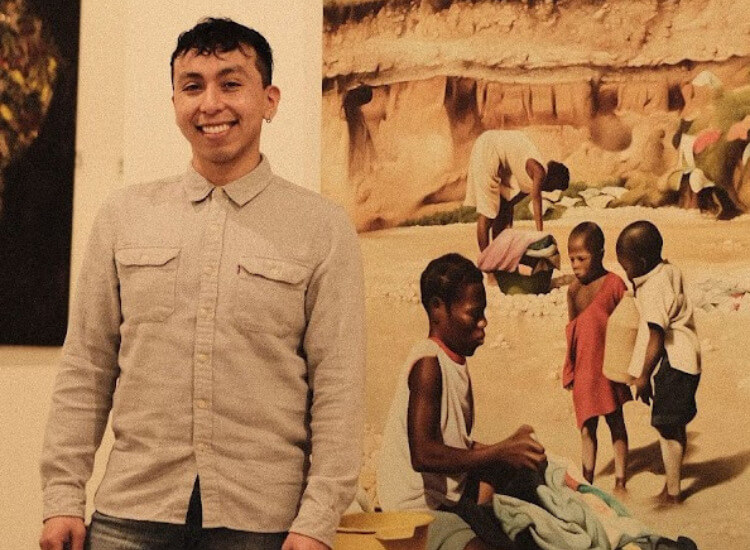
The Haitian American Museum of Chicago (HAMOC)
The Haitian American Museum of Chicago (HAMOC) is one of the first institutions to be part of Jackie Taylor’s Free to Be Initiative, but the museum’s beginnings stretch much further back. Founded by Ms. Elsie Hector Hernandez in 2012, the museum’s mission is to promote and preserve Haitian art, culture, history and...
The Haitian American Museum of Chicago (HAMOC) is one of the first institutions to be part of Jackie Taylor’s Free to Be Initiative, but the museum’s beginnings stretch much further back. Founded by Ms. Elsie Hector Hernandez in 2012, the museum’s mission is to promote and preserve Haitian art, culture, history and community. Ms. Hernandez had the dream to create an institution that would hold programs and exhibits that will contribute to the rich multicultural tapestry that is Chicago. Since it’s birth, the museum has hosted a wide array of programs and exhibits showcasing Haiti’s rich culture and art as well as its complex history. Carlos Bossard, the Director of Programs and Museum Practice shares that even though HAMOC is a museum, they’re doing a lot more than museum work. Carlos points out that “with the programs exhibits, community engagement and now even being a part of the Legal Protection Fund where the museum can help undocumented and immigrant individuals get referrals to the National Immigrant Justice Center, HAMOC is truly that epicenter for Haitian community.”
Chicago’s connection to Haitian culture extends much further back with Jean Baptiste Pointe DuSable being the first non-indigenous settler of the City of Chicago, coming to the area and starting one of the first trading posts. This early Haitian history in Chicago is Black history and the importance of HAMOC as a cultural space that preserves, archives, and collects an ethnic specific kind of cultural gives people a place to claim as their own in this city. Through the conduit of art, identity is shaped, forged. Carlos Bossard mentions that a lot of families from the Haitian diaspora visit the museum to be able to gain education, knowledge about their culture – where they can really start to education, teach, and show other generations what art, metalwork, woodwork, religious themes looked like – to see Haiti in a very vibrant and resilient manner going against the very real life narrative that is portrayed on the news. “This takes away from the violence, takes away from the sadness even just for a moment, to showcase a culture that has a huge connection to Chicago and a lot of folks here in the city just gives them a moment to be” states Bossard.
Education and knowledge of Haitian culture, of Black culture extends beyond just the diaspora, and this was one of the reasons why Elsie Hernandez chose Uptown as home for HAMOC. Uptown is an immigrant community, an arts and cultural district, and she saw that there were a lot of similarities in what her values were for the museum. Accessibility for not only the people of the culture – Haitian communities in the surrounding Chicagoland area – but also for people who are around that are not Haitian to have a chance to be educated and to learn. Carlos Bossard believes HAMOC establishing itself as a community anchor in the larger Free to Be Initiative corridor in Uptown underscores the museum’s efforts in centering community, centering education. Bossard mentions, “Jackie Taylor, building the corridor and just having this idea of something that lives past all of us…to continue to rethink how to do it in ways that is purposeful, meaningful and will bring in the communities that want to engage new people, old people to spaces that are really of, by and for these community centered organizations…it shows that we strive to find a place.”
HAMOC, in their new home along Clark Street, continues to create programming that engages a wide audience. Something that Elsie has always pushed for is having this open-door policy where really anyone from any walk of life can come to the space and feel at home; they should feel like this place is also theirs while also learning together. HAMOC’s upcoming programming for the year, A Passport to Haiti, is a 4-part immersive program which highlights different cultural aspect of the culture, aims to do just that. March will focus on cuisine and drink, April, Vodou and culture, May will shine a light on art making and the Haitian Flag, and June will explore performative Haitian style dance (Konpa). Bossard believes “with more hands, the workload is lighter… and that we really are stronger together when we all put our mind to something to make that much needed change, especially here in Uptown, in Chicago.”
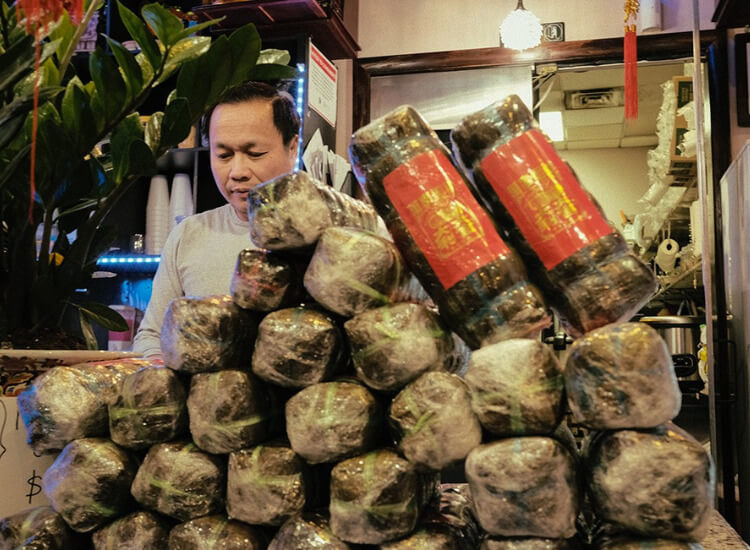
Pho Loan
Loan Nguyen, hailing from a line of cooks in Vietnam, and her husband, Quang Le, took the long route to realizing their dreams of becoming restaurateurs in the United States. The two came to the United States in 1995 and lived in California for one year before moving to Chicago. With limited resources and a need to make a living to support their family, both Loan and Quang worked in the nail industry as nail technicians. Their true passion...
Loan Nguyen, hailing from a line of cooks in Vietnam, and her husband, Quang Le, took the long route to realizing their dreams of becoming restaurateurs in the United States. The two came to the United States in 1995 and lived in California for one year before moving to Chicago. With limited resources and a need to make a living to support their family, both Loan and Quang worked in the nail industry as nail technicians. Their true passion has always been to follow their family’s footsteps in showcasing Vietnamese cuisine as cooks and restaurateurs. After years of building financial stability, the couple had the opportunity to realize their dreams when they opened Pho Loan in 2014 at 1114 W. Argyle Street.
“I decided to open my business in this area because it is the hub of Vietnamese culture and community and felt that by opening my business here would add to its continued growth and prosperity.” Loan states. As the name of their restaurant indicates, Phở is their specialty, but they serve much more than that. From traditional rice dishes like Cơm Bẩy Món Bặc Liêu, a rice dish with seven toppings, to Bún Thịt Nướng, a grilled pork vermicelli cold noodle dish, the menu is extensive. But it is the Lunar New Year where special items are seen at the restaurants. According to Loan, “Lunar New Year is the most important holiday to the Vietnamese people. During Lunar New Year, my business specializes in selling traditional Lunar New Year food items like Bánh Tét (glutinous savory rice cakes), Dua Mon (pickled vegetables), Giò Thủ (Vietnamese headcheese). During this time of year, we welcome and cater to visitors near and far who come to this area to celebrate the Lunar New Year celebrations and attend the annual parade.” By offering traditional Lunar New Year food items at their business allows for people to experience a part of the Vietnamese Lunar New Year culture and heritage. Loan “hopes that by inviting people who come from near and far to experience this, it will bring the larger community more support, prosperity, and good fortune for the years ahead.”
When asked if she has any hopes and dreams for this year of the rabbit/cat, Loan stated that her wish for this Lunar New Year for the Argyle community is for it to become a stronger, more prosperous community. With continued and further support from customers, local organizations, and the city, she hopes to see this area build up, develop further, and thrive into the future. From the owners of Pho Loan, “This Lunar New Year, we at Pho Loan wish the Vietnamese community and the Asia on Argyle community a year of good health and a year where all your wishes come true! To our customers, we wish you all prosperity and for your continued support of not only our business but the whole Asia on Argyle community!”
Stop by Pho Loan located at 1114 W Argyle Street to pick up traditional Vietnamese Lunar New Year food items (while supplies last!).
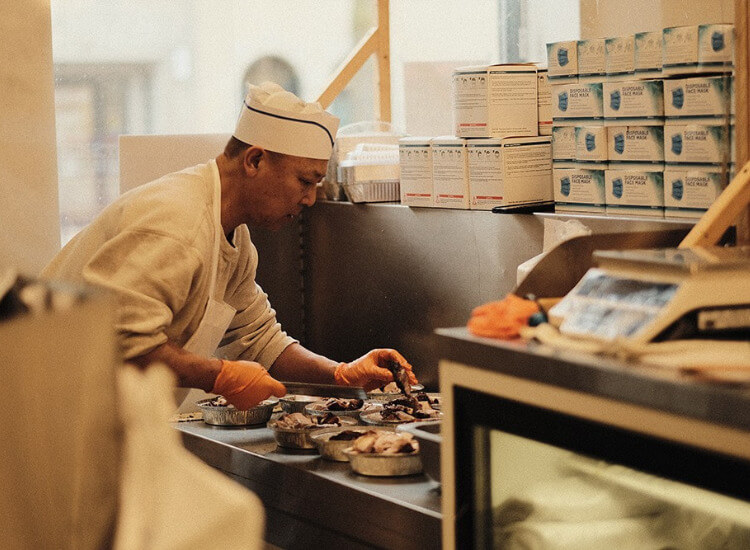
Hon Kee
For over 40 years, Paul Tsang, the owner of Hon Kee BBQ & Seafood, has experienced Lunar New Year celebrations on Argyle. He and his family opened their restaurant in 1981 and have remained a mainstay of the community since then. Specializing in Hong Kong barbeque – roasted duck, chicken, and pork – and much more, Hon Kee provides those within the diaspora specialized Lunar New Year food items for...
For over 40 years, Paul Tsang, the owner of Hon Kee BBQ & Seafood, has experienced Lunar New Year celebrations on Argyle. He and his family opened their restaurant in 1981 and have remained a mainstay of the community since then. Specializing in Hong Kong barbeque – roasted duck, chicken, and pork – and much more, Hon Kee provides those within the diaspora specialized Lunar New Year food items for dine-in and carry-out. Aside from his special Lunar New Year roasted meats, Paul mentions that the grocery stores around the area also sell important food items like mandarin oranges and candies that signify good luck and good fortune for the coming year.
If you ask Paul or any other business and community leader in the community, Lunar New Year to the Argyle community is one of the most important holidays for the Asian diaspora in this community. The significance of the Lunar New Year is that it brings in a new spirit – things like progress, good luck, good health are looked for in welcoming the new year. Each animal of the Chinese zodiac represents something specific for that new year.
According to Paul, Lunar New Year celebrations first started in the area in 1974 when the Hip Sing Association made Argyle Street their home. There’s been a parade to commemorate the Lunar New Year from 1974-1975 all the way up until now. The traditional lion and dragon dance are key components of the Lunar New Year Parade as they have cultural significance. Paul mentions that when the lions visit a local business, it signifies the sweeping away of bad luck and spirits and replacing it with good luck and prosperity in the new year for the business owners. Luck extends beyond the traditional lion dance. There are also the red envelopes. Wrapping money in red envelopes is expected to bestow more happiness and blessings on the receivers. “It is a traditional thing in our community. This all is to bring good spirits to the community in the new year”, states Paul.
When asked what he looks forward to in the Year of the Rabbit for his business and the larger Argyle community, Paul hopes the Argyle community gets stronger and stronger. “You can see the parade, even last year with the pandemic, lots of people, a few thousand people, came out and supported local businesses.” Paul believes that with the continued support of visitors and customers, from local organizations like the Uptown Chamber and Uptown United, along with the Alderman’s office and the city, the area will continue to grow and flourish.
One of the strengths Paul witnesses within the Argyle community is in its diversity. “Asia on Argyle now is very diverse. We have Thai, Chinese, Vietnamese businesses, and some Indian businesses that make up the diverse Asia on Argyle community.” The Asia on Argyle community is a place where you can come and try a lot of different kinds of cuisines and experience culture. As for Lunar New Year wishes, Paul Tsang wishes “everyone in this diverse community to continue to help each other to make the community safe and stronger.”
Hon Kee BBQ & Seafood is located at 5009 N Winthrop Ave. To get a taste of their specialized Hong Kong BBQ items, stop by after the Lunar New Year Parade this Saturday! Check out their full menu here.
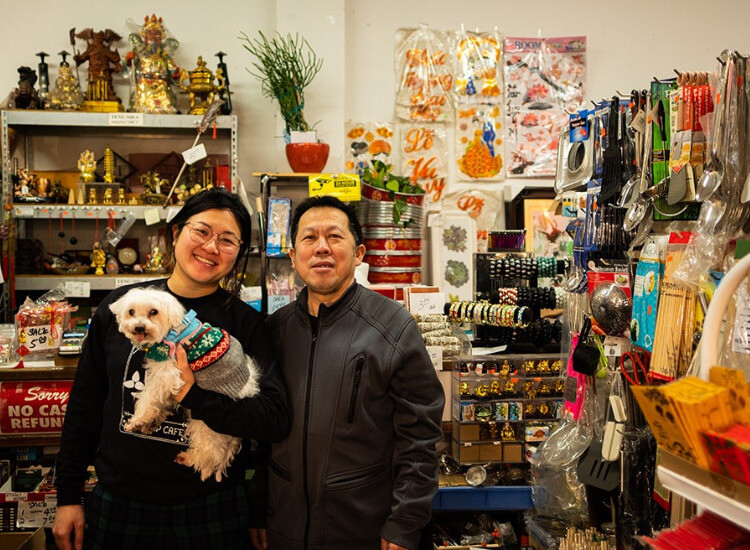
Qideas
For as long as Ellen Duong can remember, Argyle has always been a second home to her. After fleeing the Vietnam War in the early 1980s as boat people, Ellen’s parents found a community here on Argyle. It was welcoming and felt like home during a difficult time for them. Growing up on Argyle her whole life, she has fond childhood memories of getting egg tarts and juice boxes...
For as long as Ellen Duong can remember, Argyle has always been a second home to her. After fleeing the Vietnam War in the early 1980s as boat people, Ellen’s parents found a community here on Argyle. It was welcoming and felt like home during a difficult time for them. Growing up on Argyle her whole life, she has fond childhood memories of getting egg tarts and juice boxes before going to preschool to watching the streets filled with families and children who looked just like her. Argyle, as a community, is a meeting place for people to feel safe, accepted, and proud of their cultural heritage and background. For her growing up, she felt accepted and a sense of belonging on Argyle that she did not feel anywhere else in Chicago.
As a legacy business in the area for over 20 years, Qideas has now passed down to her. She feels an immense responsibility to give back to the community that helped raise her. Qideas is her love letter to Argyle, the Vietnamese diaspora and her family. As a 2nd generation business owner, she states that it has been a tough and interesting time to have a business in Argyle. Argyle has experienced a lot of change over the last eight years and it has been extremely difficult to continue to maintain a legacy business here.
Despite these challenges, there is hope leading into the Lunar New Year. For Ellen, Lunar New Year and its celebrations are a way for her to feel connected to her culture. She enjoys paying respect to traditions and getting excited to celebrate something that is uniquely special to her. The Year of the Rabbit/Cat is expected to be a year of patience as we leave behind the fighting fierce Year of the Tiger. Ellen is looking forward to continuing to build, advocate, protect, and support AAPI history and stories in the Asia on Argyle community.
Be sure to stop by Qideas, located at 1134 W Argyle Street during the Lunar New Year Parade this Saturday to support this legacy business that has contributed to the identity of Argyle over the last two decades. According to Ellen Duong, “We have Year of the Rabbit trinkets to commemorate, don’t miss out or you’ll have to wait 12 years to see it again! And to a year of patience, compassion and working together!”
